And just like that . . . 2021 is over. Like any year, it had its share of disappointments, triumphs, and scandals. There were some good books published and some good literary adaptations to watch. There were great book covers, great book reviews, and even (if we do say so ourselves) a few great pieces published in this very space.
But now it’s 2022, and it’s time to dream it all up again. If there’s anything we’ve learned in the last two years, it’s that nothing is certain—but we can be fairly sure that we’ll get to read a bunch of good books in the new year (though publication dates are even softer than usual these days, so be warned that all of the below is subject to change). Here are the ones we’re most looking forward to—so far.
JANUARY
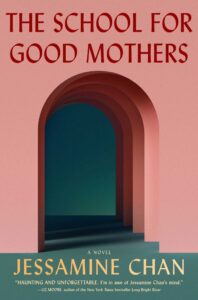
Jessamine Chan, The School for Good Mothers
Simon & Schuster, January 4
At the beginning of this novel, set in a near-future Philadelphia, a mother has a very bad day. She leaves her young daughter alone for two hours, and is reported, observed, and finally sent away to the titular school, a sort of rehab where she and other “bad” mothers must endure what amounts to psychological torture in the name of “training.” This is a chilling dystopian novel about what we expect from mothers (complete self-abnegation) and fathers (something less than that), and the horrifying possibilities of the surveillance state—all of it made all the scarier by its essential plausibility. –Emily Temple, Managing Editor
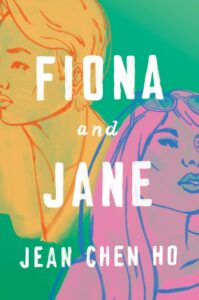
Jean Chen Ho, Fiona and Jane
Viking, January 4
Jean Chen Ho’s debut collection follows two young Taiwanese American women, Fiona Lin and Jane Shen, best friends since elementary school. They see each other through firsts, through early fumbling years and questionable LA bars. From alternating perspectives, we watch as they grow up and away from one another. Fiona moves to New York to help a sick friend, while Jane stays in California and grieves the death of her father. Still, despite the years and the distance, there are some friendships you keep coming back to. There are a lot of metaphors out there to describe the ebb and flow of far-flung friendships like this, but perhaps the most apt is that of a planet orbiting around a star. (Don’t we all have relationships that make us feel like a secondary character at times?) Fiona and Jane so precisely captures a lot that’s left unsaid in strong female friendships: small resentments that build over time, even outright betrayal. It’s a three-dimensional portrayal of their bond—the good and the bad. There is love here, and refreshing honesty, too. If you are lucky, you have had a friend like this in your life, a friend who you might want to share this book with. –Katie Yee, Book Marks Associate Editor
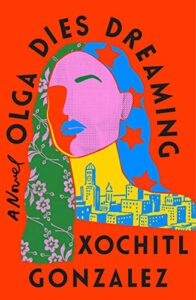
Xochitl Gonzalez, Olga Dies Dreaming
Flatiron, January 4
Olga is a wedding planner for Manhattan’s power brokers; her brother Pedro is a popular congressman representing their gentrifying Latinx Brooklyn neighborhood. They’re publicly successful—until their mother, who abandoned them, returns to their lives. Says Rumaan Alam about Gonzalez’s debut, “The extraordinary accomplishment of Olga Dies Dreaming is in how a familiar-enough tale—a woman seeking love, happiness, and fulfillment in the big city—slowly reveals itself to be something else altogether.” –Walker Caplan, Staff Writer
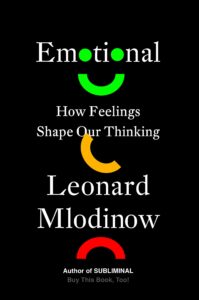
Leonard Mlodinow, Emotional: How Feelings Shape Our Thinking
Pantheon, January 11
An eye-opening investigation into the two sides of the brain (emotional and rational), and how to value and balance both, Emotional explores what happens when we ignore (and accept) our feelings, and positions itself as a guide for how to listen to our bodies and minds in a way that will create the equilibrium we crave. –Julia Hass, Contributing Editor
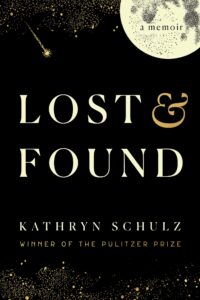
Kathryn Schulz, Lost & Found
Random House, January 11
I’m probably not the only one who first encountered Kathryn Schultz’s work through her Pulitzer Prize–winning New Yorker piece “The Really Big One,” about the earthquake that’s predicted to someday destroy the Pacific Northwest. (If you want to feel Truly Aged, that ran in 2015.) I can’t help but feel that Schultz’s memoir is an extension of that project. Lost & Found intertwines the death of Schultz’s father with the love story of her marriage, exploring the inseparability of grief and joy and “how private happiness can coexist with global catastrophe.” As we enter Pandemic Year Three, this feels like one to read. –Eliza Smith, Audience Development Editor
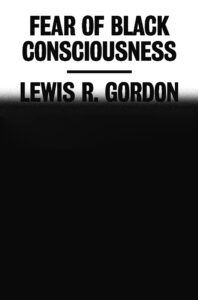
Lewis R. Gordon, Fear of Black Consciousness
Farrar, Straus and Giroux, January 11
Professor Lewis R. Gordon, the Philosophy Department Head at the University of Connecticut, offers an expansive nonfiction work that critically examines the historical roots of “racialized Blackness” and how this school of thought is shaped by the institution of whiteness. Gordon includes personal experiences, striking a fine balance between the searing imprint of memory and the accumulation of learned knowledge. Gordon points out how anti-Blackness is not only a global commodity but a weaponized form of oppression that even members of the Black community can perpetuate through colorism. His take on the Marvel blockbuster Black Panther raises questions about the world’s view of Africa and the legacy of colonial violence. This book is certainly not a light, breezy read, but Gordon’s surprising observations crack open the mind to connect various creative disciplines. –Vanessa Willoughby, Associate Editor
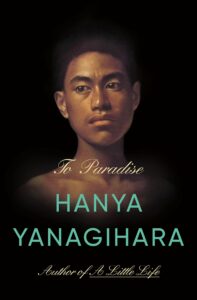
Hanya Yanagihara, To Paradise
Doubleday, January 11
Is it possible for another book to be as completely devastating as A Little Life? Probably not, but Yanagihara’s new novel is another big, bold story of many lives and many loves that promises to be just as engaging (and, let’s be honest, it’ll probably destroy all of us too). Three strands—an alternate 1893 America, 1993 AIDS-devastated Manhattan, and a totalitarian future ridden by plagues—converge in New York in a story of illness, loss, family, and love. –Emily Firetog, Deputy Editor
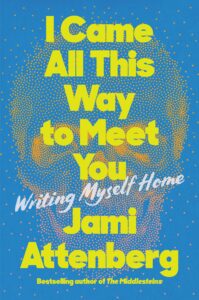
Jami Attenberg, I Came All This Way to Meet You: Writing Myself Home
Ecco, January 11
I was so excited when I heard whisperings that novelist Jami Attenberg was coming out with a memoir in 2022, and that was before I learned she’s writing about some of my favorite topics to spend time with: art and class, friendship and singlehood, and carving out a life that Just Fits. Liz Moore called it “one of the most artistically invigorating books” she’s read in years, which feels like a perfect read for January, no? –ES
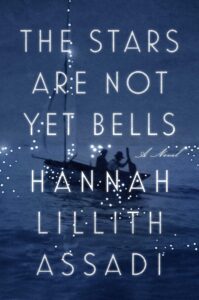
Hannah Lillith Assadi, The Stars Are Not Yet Bells
Riverhead, January 11
National Book Foundation 5 Under 25 honoree Hannah Lillith Assadi’s wonderful first novel, Sonora, was one of the most beautifully wrought debuts of recent years, so I’m tremendously excited to read her sophomore effort. In The Stars Are Not Yet Bells, an elderly woman with Alzheimer’s casts her failing mind back to 1941, when she and her new husband left New York City for a remote island off the coast of Georgia in a doomed quest to find the mysterious blue jewels that were said to lie at the bottom of the ocean. –Dan Sheehan, Book Marks Editor in Chief
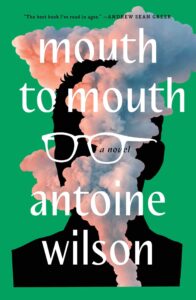
Antoine Wilson, Mouth to Mouth
Avid Reader Press, January 11
When an unnamed narrator runs into a former (half-remembered) college classmate in an airport, the man recounts the story of resuscitating a drowning stranger on a beach, and subsequently becoming obsessed with the life of the man, a renowned art dealer who does not initially reciprocate his savior’s curiosity. The New York Times called it “an enthralling literary puzzle,” which, coupled with the Highsmith echoes, is more than enough to pique my interest. –Jessie Gaynor, Lit Hub Senior Editor
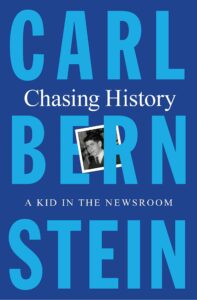
Carl Bernstein, Chasing History: A Kid in the Newsroom
Henry Holt, January 11
Carl Bernstein, of All the President’s Men fame, delivers a memoir of a life spent in some of the most fast-paced newsrooms in the country. As early as 16, Bernstein realized that he didn’t care about high school—he cared about news. He began his career as a copyboy at the Washington Star, was a reporter by 19, then moved on to greater heights. By the time he made it to the Washington Post, he had never gone to college, but had received years of hands-on education in investigative journalism. –JH
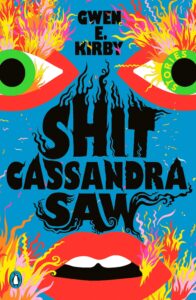
Gwen E. Kirby, Shit Cassandra Saw: Stories
Penguin Books, January 11
You had me at “Margaret Atwood meets Buffy,” but also at the title story, “Shit Cassandra Saw That She Didn’t Tell the Trojans Because at that Point Fuck Them Anyway.” If the rest of this debut collection has the same kind of irreverent energy and self-assured risk-taking, I predict great things. –ET
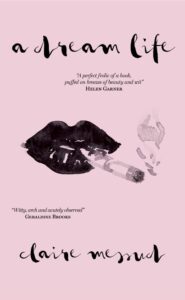
Claire Messud, A Dream Life
Tablo Tales, January 15
The novels of Claire Messud contain sharp edges in just the right places, and glint with an insight that both cuts and beguiles. A Dream Life is the compact, densely packed story of a family dislocated from New York to Sydney, Australia in the 1970s, and the small dramas that ensue. Messud always seems to have perfect command over the characters she creates (and the life that accrues around them), letting them falter through regret and self-deception without punishing them too severely because, after all, like us, they’re all too human. –Jonny Diamond, Editor in Chief
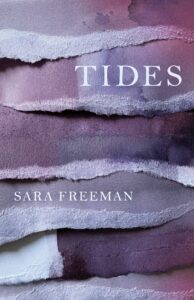
Sara Freeman, Tides
Grove, January 16
Grief is a shapeshifting beast; it takes root in everyone differently. For Mara, it manifests as a desire to run away. After an unspeakable earth-shattering loss, she leaves her family and winds up in a vacation town by the sea with next to nothing. In glinting, spare prose, we can see the outlines of her new life: By day, she searches for food. By night, she drowns out the world by swimming further into the dark. But you can’t block out reality forever. It finds a way of seeping in. In a material sense, the money finally runs out, and she’s forced to find work at a local wine shop. In an emotional sense, she has to face what she’s fled from if she is ever going to pursue an honest relationship with the shop owner. It’s a beautiful portrait of a woman unmoored—and the connections that bring her back. –KY
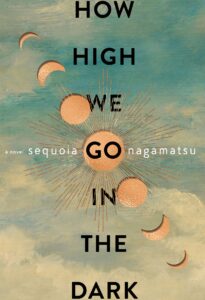
Sequoia Nagamatsu, How High We Go in the Dark
William Morrow, January 18
This impressive, far-reaching debut begins in 2030, as an archaeologist arrives in the melting Arctic Circle, where he finds no trace of his lost daughter, but does find the discovery that entranced her: the remains of an ancient child whose body, it turns out, holds an equally ancient virus. So yes, this is a plague novel, a pandemic novel, one that both honors individual tragedy and asks us to widen our perspective—to look to the future, to the stars. The chapters, which feel like linked short stories, jump decades and centuries, imagining the long-term effects of the Arctic Virus on the world and even the galaxy, without losing touch with the smaller stories of the humans who must contend with it. –ET
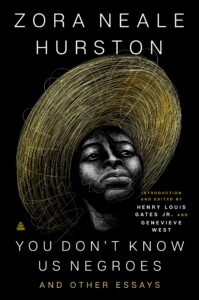
Zora Neale Hurston, You Don’t Know Us Negroes
Amistad, January 18
The rediscovery of any piece of writing by Zora Neale Hurston is a cause for celebration, so this 460-page bumper collection of pieces feels almost like an embarrassment of riches. Spanning more than 35 years, You Don’t Know Us Negroes is the first comprehensive collection of essays, criticism, and articles by the legendary Harlem Renaissance author, covering topics like the birth of the Montgomery bus boycott, the integration of schools, the desegregation of the military, and the trial of Ruby McCollum. This fiery chronicle of Black life in America through the eyes of one of the greatest literary figures of the 20th century is not to be missed. –DS
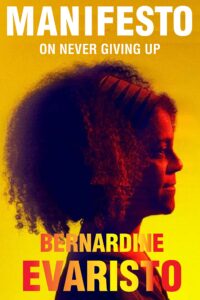
Bernardine Evaristo, Manifesto: On Never Giving Up
Grove, January 18
Bernardine Evaristo made history in 2019 when she became the first Black woman and first Black British person ever to win the Booker prize. That landmark victory brought with it a legion of new fans, all of whom will surely be eager to read her highly anticipated nonfiction debut. Manifesto is a hybrid work—part memoir, part advice manual for struggling creatives—which charts Evaristo’s remarkable life and rebellious career from her early years as one of eight children in a mixed-race family, to her setting up of Britain’s first Black women’s theatre company, to her steadfast determination to write the books that were missing from Britain’s bookshelves. An illuminating and inspirational window into the life of a brilliant artist, determined to make her mark. –DS
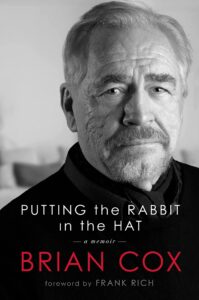
Brian Cox, Putting the Rabbit in the Hat
Grand Central, January 18
If Brian Cox’s lifetime of legendary performances doesn’t convince you to read his memoir, how about the fact that he apparently pulls no punches when it comes to his fellow fame-os, from Johnny Depp (“so overblown, so overrated”) to Quentin Tarantino (“I find his work meretricious”). I’ve been saying it for years: more salty celebrity memoirs! –JG
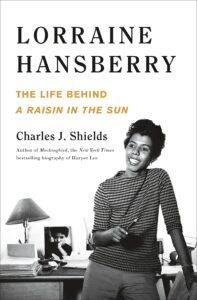
Charles J. Shields, Lorraine Hansberry: The Life Behind A Raisin in the Sun
Henry Holt and Co., January 18
This thoroughly researched biography focuses on the personal life and literary legacy of Lorraine Hansberry. Readers learn about Hansberry’s family background and how her upbringing shaped her politics. Shields doesn’t present a romanticized version of Hansberry’s journey to artistic visionary—the playwright’s flaws and insecurities are shared alongside her strengths. Shields also devotes considerable attention to the literary influences that inspired Hansberry, which included James Baldwin, Sean O’Casey, and Simone de Beauvoir. Hansberry’s romantic relationships with women aren’t treated as a character deficit or fleeting fancy but an undeniable component of her evolution as an actualized person and a creative. Overall, Shields’s portrait of the playwright, who died too soon at the age of 34 from pancreatic cancer, is a rich ode to a trailblazer who refused to conform to society’s expectations of Blackness, queer identity, and the role of a Black author. –VW
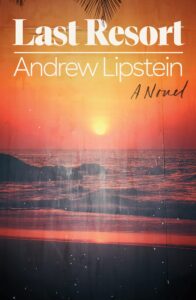
Andrew Lipstein, Last Resort
FSG, January 18
Here’s some literary catnip for you: 27-year-old Caleb, casting about for some purpose in life, has a semi-random encounter with a college acquaintance who tells him a great story—which Caleb then uses as the backbone for a novel. Unfortunately for Caleb, said acquaintance works in publishing, which means he’s caught, so to speak, while the book is still on submission, which results in a welcome and twisted deviation from the usual plagiarism plot. But the question remains: whose novel is it? And what does each of them—the one who lived it, the one who wrote it—deserve? Soon Caleb finds himself in a slow-motion literary-world car crash, but it’s so horribly delicious that the reader (especially the reader who is also a writer) won’t even dream of looking away. –ET
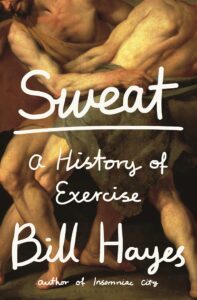
Bill Hayes, Sweat: A History of Exercise
Bloomsbury, January 18
Part history, part travelogue, part memoir, Sweat tackles the rich topic of exercise (distinct from sports), from Hippocrates to Jane Fonda. I’m fascinated by the evolution of exercise culture, and I look forward to learning about how we got from those vibrating belts to HIIT (and maybe whether we can expect a return to the vibrating belts anytime soon, because they seem a lot more fun). –JG
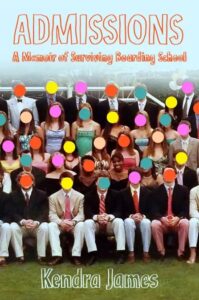
Kendra James, Admissions
Grand Central Publishing, January 18
I went to public school, but for some reason, I’m fascinated by the narrative possibilities that can happen with private education. Kendra James, a founding editor of Shondaland.com, offers a memoir about her time at The Taft School, a coeducational, private school in Connecticut. James was the first Black legacy student and a few years later, became an admissions officer who focused on diversity recruitment for independent prep schools. This role eventually caused James to reflect on her past and the inequities of the American education system. There is plenty of fiction and nonfiction works about private schools, but James’s perspective as a young Black woman navigating the hierarchies of this world is not as common. –VW
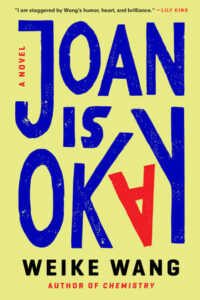
Weike Wang, Joan is Okay
Random House, January 18
I’ve been waiting for the next novel from Weike Wang since her excellent 2017 novel Chemistry, which managed to be a campus novel, a work novel, a love story, and an examination of modern consciousness all at the same time. Joan is Okay lifts us from the PhD world into the world of a busy NYC ICU, which only makes sense, but Wang’s underlying concerns of identity, family, and culture seem to be well intact here. Can’t wait to read more from her. –ET
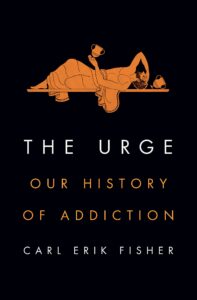
Carl Erik Fisher, The Urge: Our History of Addiction
Penguin Press, January 25
In his nonfiction debut, physician and bioethicist Carl Erik Fisher charts the history of addiction treatments through medicine, science, literature, religion, public policy, and his own alcoholism and recovery. Through a blend of memoir and research, Fisher’s created a call to reconsider how we discuss, treat, and politicize addiction. –WC
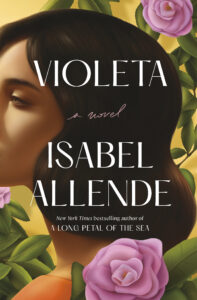
Isabel Allende, Violeta
Ballantine, January 25
The internationally acclaimed Isabel Allende’s latest book—following novels including The House of the Spirits, Of Love and Shadows, Eva Luna, Paula, and In the Midst of Winter—comes in the form of a letter from protagonist Violeta Del Valle, who, at 100, has lived through many of the major events of modern history. Allende is an extraordinary storyteller, and I’m excited to see where she takes this character. –Corinne Segal, Senior Editor
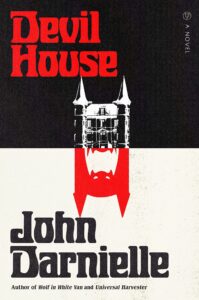
John Darnielle, Devil House
MCD, January 25
The man behind The Mountain Goats is a rising star in the literary fiction world, and with very good reason. Darnielle’s marvelously unsettling Wolf in White Van (about a reclusive and severely disfigured video game designer) and Universal Harvester (about a 90s Iowa video store clerk who discovers that someone has been modifying the VHS tapes…) were both critically acclaimed and nominated for major awards. His new novel, the deliciously titled Devil House, is the story of a once-successful true-crime writer who moves into a California house where a pair of murders took place during the “Satanic Panic” of the 1980s. Expect the unheimlich. –DS
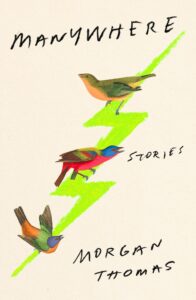
Morgan Thomas, Manywhere
MCD, January 25
So far, I’ve only read one of the stories from Thomas’ debut collection, but it was more than enough to move this one to the top of my list. Louie, the narrator of “Bump” is a trans woman who longs for a child so much that when a coworker asks if she is, Louie can’t deny it. Instead, she buys several prosthetic bumps on the internet and keeps up the illusion. The story is compelling and humane and lovely, and I can’t wait to read the whole collection, which Kirkus calls “a visionary and keenly observed debut.” –JG
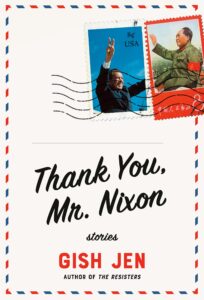
Gish Jen, Thank You, Mr. Nixon
Knopf, January 25
Gish Jen’s The Resisters was one of my favorite reads of 2021, so you better believe I’ll be snapping up her collection. Thank You, Mr. Nixon captures the 50 years since Nixon’s historic trip to China, probing US-China relations through the journeys of her characters. –ES
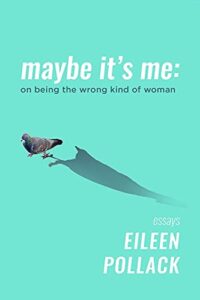
Eileen Pollack, Maybe It’s Me: On Being the Wrong Kind Of Woman
Delphinium, January 25
Too smart, too independent, too insubordinate: Eileen Pollack found herself, growing up in the 1960s, not the right kind of girl. This humorous collection of essays charts a life lived in defiance of society’s rules for women, from anecdotes about childhood to the trials of online dating in your sixties in New York City. –CS
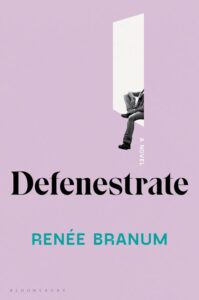
Renée Branum, Defenestrate
Bloomsbury, January 25
Branum’s dazzling debut novel combines a contemporary story of familial alienation and grief, the history of a family curse that entails untimely death via splat, and meditations on falling (prat, à la Buster Keaton; in love; from an airplane, becoming legend). Told in a series of vignettes, Defenestrate feels less fragmentary than tightly woven, and with every sentence shimmering. At points I had the sense of visiting a tiny and lovingly curated archive. The novel is lyrical and lovely and slyly funny, yet deceptively propulsive. One to stay up all night reading and immediately begin again. –JG
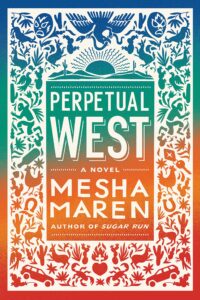
Mesha Maren, Perpetual West
Algonquin, January 25
In Maren’s follow up to her excellent, claustrophobic Sugar Run, a young couple moves from Virginia to El Paso, where they begin to unravel: Alex lured across the border to Mexico by lucha libre and love; Elana losing touch with the things that once tethered her to herself. The publisher’s description promises missionaries, wrestling matches, a cartel compound, and an investigation of “the false divide between high and low culture,” which all sounds pretty good to me. –ET
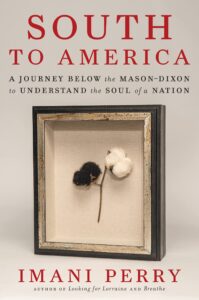
Imani Perry, South to America
Ecco, January 25
Imani Perry blends reportage, memoir, and travelogue in this introspective, probing study of the American South. Perry unpacks the stereotypical markers associated with the South, showing how the South holds the key to understanding the evolution of our nation. A guiding theme of the book shows how environment can shape people—physically, mentally, and emotionally. In the introduction, Perry writes, “Its [the South’s] legacy of racism then is… bloodier than most. But other regions are also bloody in deed. Discrimination is everywhere, but collectively the country has leeched off the racialized exploitation of the South while also denying it.” Perry’s seamlessly crafted work is a tour-de-force reckoning. –VW
FEBRUARY
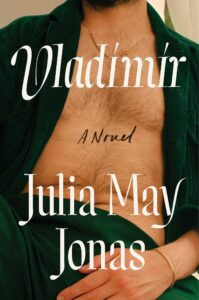
Julia May Jonas, Vladimir
Avid Reader Press, February 1
Oh snap. This debut novel is compulsively readable, deliciously wicked, and extremely fun—not least because it contains all of my favorite things: obsession, sex, academics, literary ambition (thwarted and non), a sharp-edged narrative voice that you can’t quite pin down (morally, anyway). It also contains something that I didn’t expect, though should have, considering the premise—a professor becomes infatuated with a new hire while her husband faces a termination hearing for sleeping with his students: a clear-eyed and judicious examination of the current social climate at universities. –ET
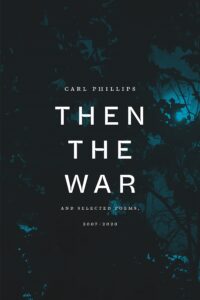
Carl Phillips, Then the War: and Selected Poems, 2007-2020
FSG, February 1
With the incomparably gorgeous, deftly poetic sentences that make up his work, Carl Phillips has been exploring intimacy, sexuality, and interiority for more than a decade. Then the War promises to be a treasure, including new poems as well as a selection of past work, the prose memoir “Among the Trees,” and the chapbook Star Map with Action Figures. –CS
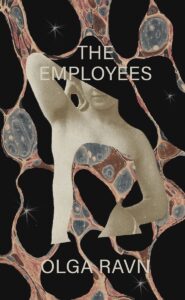
Olga Ravn, tr. Martin Aitken, The Employees: A Workplace Novel of the 22nd Century
New Directions, February 1
A spaceship, a workplace, a faded memory of Earth. Ravn’s sci-fi novel, made up of a series of witness statements, follows the Six-Thousand Ship and its human and not-quite-but-almost-human crew members. When objects from the planet New Discovery end up on the ship, the crew members develop a strange attachment to them, yearning for warmth and affection, the things and moments from Earth. Picking at the seams of productivity, Ravn’s novel ultimately illuminates the kinds of longings that sit at the center of human beings, and the complicated state of being human. –Snigdha Koirala, Editorial Fellow
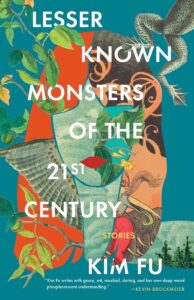
Kim Fu, Lesser Known Monsters of the 21st Century
Tin House, February 1
I love reading the descriptions of short story collections—they’re little treasure chests of weirdness. This one sold me on descriptions such as “a runaway bride encounters a sea monster” and “an insomniac is seduced by the Sandman.” I never knew I wanted to read a Sandman seduction story, but reader, I do. –ES
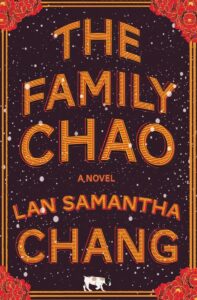
Lan Samantha Chang, The Family Chao
W.W. Norton, February 1
Chang’s latest novel—her first in a dozen years—is a reimagining of The Brothers Karamazov set in a family-owned Americanized Chinese restaurant in small-town Wisconsin. In a starred review, Publishers Weekly called the novel “timely, trenchant, and thoroughly entertaining.” I can’t wait to devour it. –JG
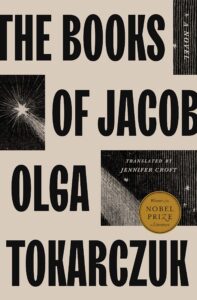
Olga Tokarczuk, tr. Jennifer Croft, The Books of Jacob
Riverhead, February 1
Nobel Prize winner Tokarczuk’s massive (seriously massive, at 995 pages) historical novel follows the rise and fall of a mysterious messianic religious leader in eighteenth century Europe. Jacob Frank traverses empires with his disciples – born Jewish, he converts to Islam, then Catholicism, is labeled both a heretic and a Messiah. The book was an instant best-seller and won Poland’s most prestigious literary prize, so despite the impressive bulk, this is at the top of my TBR list. –EF
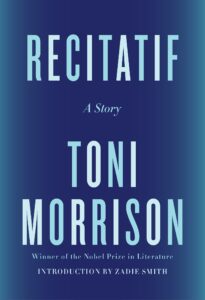
Toni Morrison, Recitatif: A Story
Knopf, February 1
First published in 1983 in Confirmation: An Anthology of African American Women, edited by Amiri Baraka and his wife Amina Baraka, Recitatif is the only short story written by the powerhouse novelist. The title is a reference to the French form of “recitative,” a musical styling that is often used in operas. The story centers on childhood friends Twyla and Roberta, who drift apart as they grow older. The former confidantes find that although they now believe in conflicting ideologies, there is still an indescribable bond between them. Morrison purposely doesn’t identify which woman is Black and which is white and described the story as “an experiment in the removal of all racial codes from a narrative about two characters of different races for whom racial identity is crucial.” Morrison’s sharp-eyed treatment of race, racism, and racial hierarchies remains relevant, digging deep into the marrow of society’s maladies. –VW
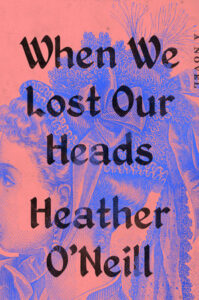
Heather O’Neill, When We Lost Our Heads
Riverhead Books, February 1
Heather O’Neill’s historical fiction novel combines two of my favorite topics: destructive female friendships and high society snobs behaving badly. Set in 19th-century Montreal, the narrative centers on Marie Antoine, the daughter of the richest man in the city, and Sadie Arnett, a scheming newcomer who seems to be cut from the cloth of Becky Sharp. The two frenemies lose touch and then later reconnect. Sex, lies, drama, deception, and glamour—sign me up! –VW
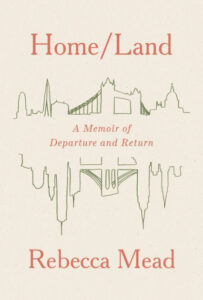
Rebecca Mead, Home/Land: A Memoir of Departure and Return
Knopf, February 8
Rebecca Mead, a New Yorker staff writer, brings us the story of resettling in one’s own homeland and reckoning with its changes over time. Mead moved back to London in 2018 after living in New York City for three decades, and this book, a reported memoir, portrays the evolution of her relationship with the city and her examination of what it has become. –CS
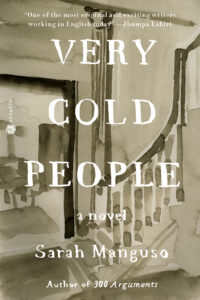
Sarah Manguso, Very Cold People
Hogarth, February 8
Sarah Manguso’s debut novel—need I say more? I mean, I will for posterity. Very Cold People (a title after my own heart) is about a girl named Ruthie reckoning with the sins and constraints of her small Massachusetts hometown. Manguso’s made a name for herself in nonfiction with her slim-yet-weighty lyrical books including The Guardians and 300 Arguments, and I can’t wait to see how her style translates to fiction. –ES
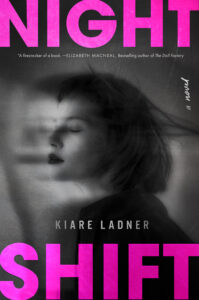
Kiare Ladner, Nightshift
Custom House, February 8
This exciting debut by Kiare Ladner revolves around the friendship between Meggie and Sabine—but possibly “friendship” is too strong a word. It’s more like a fixation, a decision on Meggie’s part to emulate and follow Sabine to the ends of the earth. Meggie meets Sabine at work, and even though Meggie seems to have all the facets of a good life (stable job, boyfriend, education), when she meets Sabine, she would, and does, throw it all away just for the chance to live alongside her. When Sabine trades her hours for the nightshift, so too does Meggie, and they begin living their nocturnal life together, exchanging the plain ease of daytime and boyfriends and normalcy, for the mystery and liminality of the night, and all it shrouds and reveals. –JH
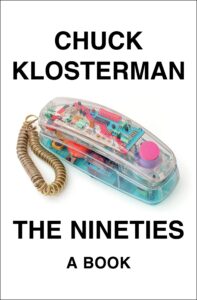
Chuck Klosterman, The Nineties
Penguin Press, February 8
I’ve loved Chuck Klosterman’s incisive cultural criticism ever since reading the absurdly fun Sex, Drugs, and Cocoa Puffs: A Low Culture Manifesto. Now, The Nineties promises a deep dive into the decade of grunge and the last one before the internet infiltrated every single part of how humans relate to one another. It’s an era that happened so recently that we still don’t understand it—and, in Kloserman’s view, this is the perfect time to try to make sense of it all. –CS
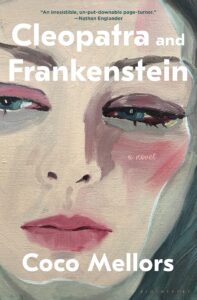
Coco Mellors, Cleopatra and Frankenstein
Bloomsbury, February 8
Cleo is a 24-year-old painter with an expiring student visa; Frank is 20 years older and financially stable (and then some). Their “impulsive marriage” sets off all sorts of reactions in their circle of friends and family—not to mention their individual reactions as they settle in as husband and wife. It’s giving me early-season Girls vibes, which I’m very much here for. –ES
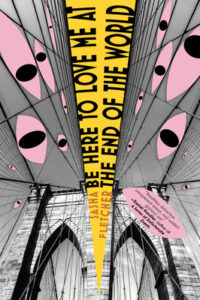
Sasha Fletcher, Be Here to Love Me at the End of the World
Melville House, February 8
Poet Sasha Fletcher’s debut novel is a love story (good) about a freelancer (relatable) in Brooklyn (yes) in winter (nice) with a strange President (classic). Says Alexandra Kleeman, “This book roils with beauty, with enthusiasm, with love for both the minuscule and oversized wonders of the world.” I believe her. –WC
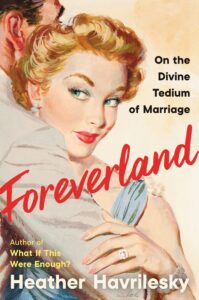
Heather Havrilesky, Foreverland: On the Divine Tedium of Marriage
Ecco, February 8
I’m a longtime fan of Heather Havrilesky’s “Ask Polly” columns (once at New York Magazine and now on her Substack); even when they’re about something specific and bonkers—like the person whose in-laws were trying to poison her with mushrooms—Havrilesky always manages to make them accessible, familiar, hilarious, and life-affirming. I expect nothing less from her new book, Foreverland, though it’s not a book of advice, per se. This time Havrilesky is turning towards herself—and her marriage and family—and revealing it to the world. She has woven these ideas in to her advice columns in the past, but never have we been treated to such a broad examination of modern marriage, with her own experiences at the core. Both married and unmarried audiences will find something to cherish in this book on what it means to have a good marriage, what a marriage is at all, and how to retain one’s identity, as well as desires, in the face of binding yourself to another. –JH
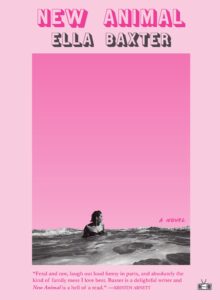
Ella Baxter, New Animal
Two Dollar Radio, February 15
In this raw, arresting novel, Amelia Aurelia—a cosmetic mortician—goes into a tailspin after the death of her mother. Included in the tailspin are: a trip to Tasmania, an uncertain communion with her birth father, dating apps, a BDSM club, kink-related paperwork, a horse head, painting a man’s face with menstrual blood, mean texts. Ultimately, is a book about something that seems obvious, but so often isn’t: the inextricability of mind and body, and the importance of our connections with other people. –ET
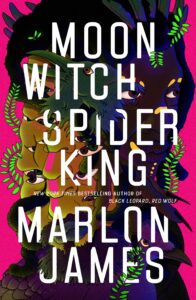
Marlon James, Moon Witch, Spider King
Riverhead, February 15
The second novel in Booker Prize-winner Marlon James’ Dark Star trilogy (aka his “African Game of Thrones”), Moon Witch, Spider King shifts its focus to Sogolon the Moon Witch (who, as you may recall, clashed with Tracker in the latter’s search for a disappeared boy in Black Leopard, Red Wolf). In this installment, Sogolon gives her own account of what happened to the boy, and of the century-long feud she had with the powerful and sinister Aesi, chancellor to the king. Told with James’ inimitable linguistic verve, this promises to be another riotous, ultraviolent, dazzlingly inventive epic in an already-groundbreaking saga. –DS
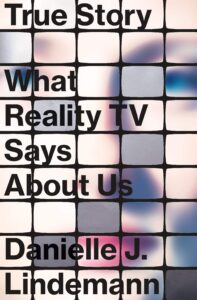
Danielle J. Lindemann, True Story: What Reality TV Says About Us
Farrar, Straus and Giroux, February 15
Like many people, when I need to detach my brain, I indulge in the absurdity of reality TV. I’m not a Real Housewives person, but I do dip into Bravo’s other offerings like Below Deck and Summer House. And as someone who is a self-identified pop culture nerd, I do think that our reactions and interpretations of reality TV can reflect our culture. Danielle J. Lindemann’s book seems like a sharp sociological analysis of how race, gender, and class intersect within the genre. –VW
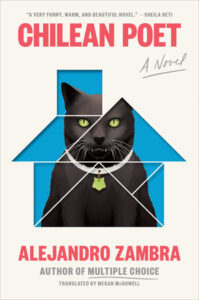
Alejandro Zambra, tr. Megan McDowell, Chilean Poet
Viking, February 15
Who doesn’t love a novel about poets? Poets are like regular people but with extra feelings; this is why they make incredible fictional subjects for love stories and tragedies and capers and mysteries and… all of the above? So I can’t wait to get my hands on Zambra’s latest, which advertises its subject matter in the title, and follows a young poet in Santiago, Chile as he navigates life among his two families, the chosen (poets!) and the actual (also poets). –JD
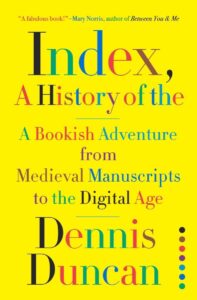
Dennis Duncan, Index, A History of the: A Bookish Adventure from Medieval Manuscripts to the Digital Age
W.W. Norton, February 15
Nowadays, we take the search function for granted; but it was a long road to get here. Dennis Duncan’s full-length nonfiction debut catalogues the life of the index, the humble but mighty index, from thirteenth-century European monasteries to present-day Silicon Valley. As the ways we read expand and morph—into ebooks, Substacks, Patreons, NFTs—it’s worth taking a look back at the history of how we’ve organized what we know. It’s the age of information, but it always has been. –WC
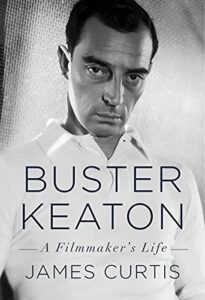
James Curtis, Buster Keaton: A Filmmaker’s Life
Knopf, February 15
It always seems that multiple books about an icon emerge at the same moment: and it is now filmmaker and actor Buster Keaton’s time to shine. Curtis’s offering is a definitive biography that delves into the mystery behind the man who made America laugh in the early years of film. Curtis, the author of biographies of stars like Spencer Tracy and W.C. Fields, now turns his gaze on Keaton, telling stories of his early vaudeville years with his family, contract disputes, his struggle with drinking, and problematic ex-lovers. –JH
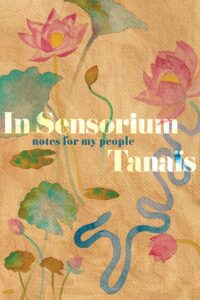
Tanaïs, In Sensorium: Notes for My People
Mariner Books, February 22
The power of scent, specifically its ability to preserve memories, cannot be overstated. I love my little collection of perfumes and get the same amount of delight and satisfaction out of the “low-end” celebrity perfumes (Princess of Pop Britney Spears really does have some nice, inexpensive perfumes!) as I do the opulent designer offerings (I’m coming for you, Tom Ford’s Black Orchid!). Using their personal experiences and identity as an American Bangladeshi Muslim as a narrative framework, Tanaïs examines the role of fragrance in South Asian history. Tanaïs is also an independent perfumer and beauty designer, so I’m interested in seeing how they blend their industry knowledge with the vulnerability of memoir. –VW
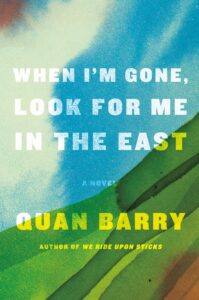
Quan Barry, When I’m Gone, Look for Me in the East
Pantheon, February 22
This novel couldn’t be any more different from Quan Barry’s deliciously irreverent 2020 novel We Ride Upon Sticks—except that it is similarly excellent, and similarly immersive, a full-throated plunge into a very specific, fascinating world. When I’m Gone, Look for Me in the East is technically about twin brothers—one of whom is a monk, the other a former monk—on a quest to find the reincarnation of a famous lama in Mongolia, but it is really much more about Buddhism, love, and the metaphysics of being. –ET
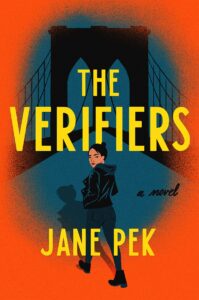
Jane Pek, The Verifiers
Vintage, February 22
I first became familiar with Jane Pek after reading her short story “Portrait of Two Young Ladies in White and Green Robes (Unidentified Artist, circa Sixteenth Century)” in Conjunctions. I was so taken in by her descriptive language and lush, immersive imagery. The story’s narrator is unabashedly vulnerable, her confessions loaded with the heaviness of regret. Pek’s debut novel is a contemporary mystery and centers on amateur sleuth Claudia Lin, who defies her parents’ traditional gender roles and gets a job at a dating detective agency. When a client disappears, Claudia finds herself entangled in a web of deceit. Pek has already proven that she’s adept at crafting the rich inner world of her characters, so I’m looking forward to her take on genre fiction. –VW
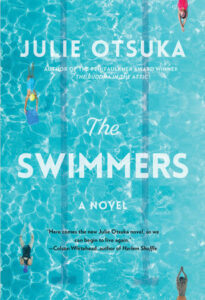
Julie Otsuka, The Swimmers
Knopf, February 22
I remember the exact moment I read the opening pages of The Buddha in the Attic. I was in the Union Square Barnes and Noble and I opened a book on the new releases table. I had finished my first year of an MFA and was pretty sure I knew what writers were allowed to do. I ended up reading half that novel, standing at that same table, a story written in first person plural about Japanese picture brides immigrating to America in the early 1900s. It was beautiful and perfect, and now we get The Swimmers. Otsuka’s new novel is about a group of (rather obsessed) recreation swimmers and what happens when a crack appears at the bottom of their pool. Alice, one of the swimmers who is cast out into non-pool life, must then grapple with haunting memories of her childhood and the Japanese American internment camp as well as the reappearance of her estranged daughter. Otsuka is a beautiful writer and The Swimmers promises to be brilliant. –EF
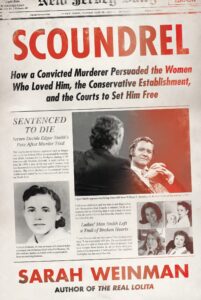
Sarah Weinman, Scoundrel: How a Convicted Murderer Persuaded the Women Who Loved Him, the Conservative Establishment, and the Courts to Set Him Free
Ecco, February 22
In 1957, a teenage girl named Victoria Zielinski was murdered by a man named Edgar Smith. For the duration of the 60s, while in prison for the crime, Smith wrote numerous pleas for the overturning of the conviction, including to William F. Buckley Jr. In 1971, Edgar Smith was released, in large part thanks to Buckley, who led a campaign on his behalf, being apparently unable to believe that someone who held him (and his conservative beliefs) in such high regard could be a murderer. In 1976, Smith attempted murder again, and was finally shut away for life. Sarah Weinman does an impeccable job with this wild story of murder, celebrity, politics, and the American ability to put unsavory characters on a pedestal. –JH
MARCH
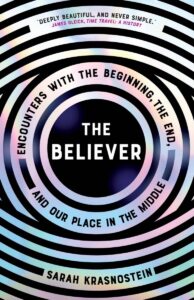
Sarah Krasnostein, The Believer: Encounters with the Beginning, the End, and our Place in the Middle
Tin House, March 1
A fascinating portrait of the human condition, Sarah Krasnostein’s latest explores a range of belief systems through six profiles—of a death doula, a geologist, a ghost-hunting neurobiologist, ufologists, a woman accused of murder, and Mennonite families living in New York. A great read for our “deeply fractured times,” as they say. –ES
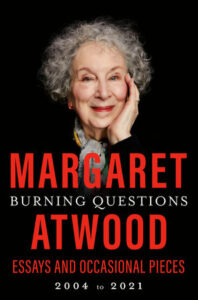
Margaret Atwood, Burning Questions
Doubleday, March 1
What I would give to live inside the mind that brought us The Handmaid’s Tale! Burning Questions offers us a generous, enjoyable glimpse. It takes a special kind of writer to bring such a wide variety of topics under one roof. Here we have: the power of storytelling across cultures, Trump, the pandemic, the climate crisis, zombies—yes, zombies. Many of these topics may be timely, but I’m sure there is sage wisdom in here for the ages. All hail Margaret Atwood! –KY
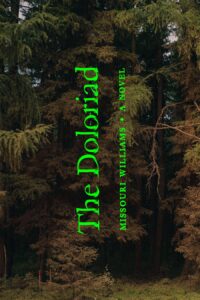
Missouri Williams, The Doloriad
MCD x FSG Originals, March 1
This book sounds extremely up my alley: lyrical, visceral, depraved, demented, a post-apocalyptic Greek tragedy (read: an incestuous family whose Matriarch dreams of singlehandedly rebooting humanity) run through with VHS tapes and madness. Plus, Mary South compared it to Geek Love! I am sold. –ET
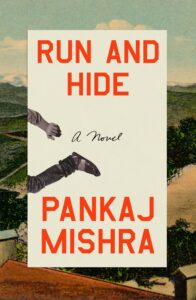
Pankaj Mishra, Run and Hide
FSG, March 1
Pankaj Mishra is an exceedingly elegant systems thinker; his unparalleled intellectual grasp of contemporary political and economic culture is always a delight to encounter. Mishra writes with erudition, clarity, and deep humanity, and doesn’t shy away from satisfyingly targeted polemics that call out shallow thinking in service of power. But apparently he’s also a novelist? Run and Hide is Mishra’s first work of full-length fiction in 20 years, and tells the story of three friends who rise from humble origins—and the vaunted classrooms of the Indian Institute of Technology—to claim a seat at the global tech table, along with all the money, prestige, and jetsetting hubris that comes with it. –JD
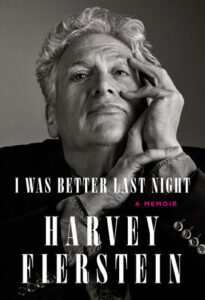
Harvey Fierstein, I Was Better Last Night
Knopf, March 1
This memoir by the four-time Tony Award-winning actor and playwright, gay rights activist, and all-round cultural icon (whose inimitable voice was once memorably compared to that of “a deep-throated jazz diva who has just tossed back a double-bourbon”) is sure to be an absolute delight, as well as a fascinating window into the gay rights movement of the 70s and 80s and the New York theater scene of the past four decades. “I never thought I’d spill my guts but, when COVID locked me in with my computer, I figured I’d amuse myself and give this a try,” Fierstein said of I Was Better Last Night. “Well, here is the outrageous, juicy, scary, and mostly true result of my efforts.” Audiobook strongly recommended. –DS
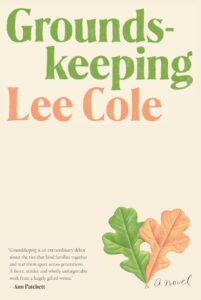
Lee Cole, Groundskeeping
Knopf, March 1
As someone constantly awaiting the next great campus novel, I am already counting the days until debut. Cole’s campus denizens are the classic writer in residence, Alma, and less classically: the groundskeeper, Owen. They are similar in some ways—they both write, and are obsessed with the craft and the story of their lives—but different in almost every other way: class, political upbringing, education. What could go wrong? –JH
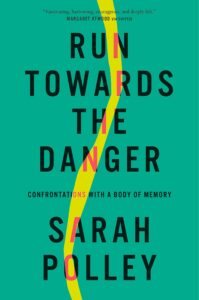
Sarah Polley, Run Towards the Danger: Confrontations with a Body of Memory
Penguin Press, March 1
Sarah Polley’s autobiographical documentary, The Stories We Tell, is one of my favorite works of art, in any medium. And now, in an era when we all seem to be revealing ourselves, all the time, via an endless shallow stream of digital ephemera, the depth of Polley’s 2012 cinematic memoir is even more of a revelation. So I am eager to dig into Run Towards the Danger, a collection of six essays that promise to “capture a piece of Polley’s life as she remembers it, while at the same time examining the fallibility of memory, the mutability of reality in the mind, and the possibility of experiencing the past anew, as the person she is now but was not then.” –JD
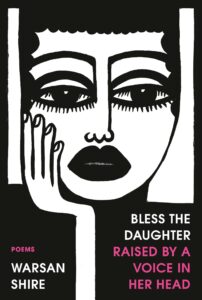
Warsan Shire, Bless the Daughter Raised by a Voice in Her Head
Random House Trade Paperbacks, March 1
This full-length collection of poetry by Somali British poet Warsan Shire depicts a journey to womanhood intermixed with pop culture and news references. Shire’s body of work has always impressed me with its triumph of visceral, biting imagery. Known for her contributions to Beyoncé’s visual album Lemonade and Black Is King, Shire uses language to shape loneliness into wise phantoms and transform heartbreak into blood, muscle, and bone. It’s evident in earlier poems like “The House,” wherein women are sanctuaries under siege and men are brute practitioners of ultraviolence. Shire’s poetry flows with power like the earth splitting wide open. –VW
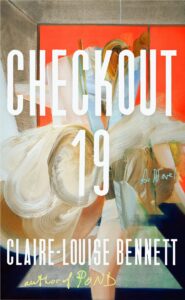
Claire Louise Bennett, Checkout 19
Riverhead, March 1
This is an easy one: Checkout 19, recently published in the UK, has already seen its fair share of rave reviews. Just as with Bennett’s Pond, don’t expect a linear story, but do expect ramblings, musings, interiority, and the poetry of thought, even on mundanity. Bennett has the superb ability to capture the reality of a mind: it is rare to think in fully formed, conclusion-ridden ideas, after all. Our brains are often a maze, and we find ourselves repeating, circling, ending up somewhere we didn’t mean to go. Checkout 19 is a fresh take on the coming-of-age novel—one in which we don’t already know how the story will end, or if it will have an “ending” at all. Bennett manages to convince the reader that somewhere, her narrator continues to think and ponder and live and wrestle with being in a body, like the rest of us. –JH
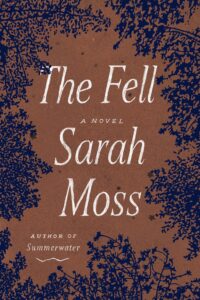
Sarah Moss, The Fell
FSG, March 1
If you’ve read Ghost Wall and Summerwater, you know a Sarah Moss book when you see it! There is always the electric touch of danger lacing its fingers through the story. In this particular tale, a woman is confined to her house for a mandatory quarantine. It’s a suffocating situation we can all relate to. So, she sneaks out for a walk. No one has to know! But as the title implies, she slips and falls. There she lies: injured, vulnerable, at the mercy of those around her. It’s the end of the world, seen from a particular angle only the incisive Sarah Moss could show us. And if you’re wondering why you should read another book about the pandemic that you are still living through, it’s because there is a good dose of humor and humanity in these pages, too. –KY
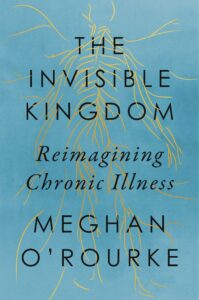
Meghan O’Rourke, The Invisible Kingdom: Reimagining Chronic Illness
Riverhead, March 1
Megan O’Rourke’s nearly decade-long investigation into chronic illness is part memoir, part journalism, filled with interviews with doctors, patients, researchers, and public health experts. The Invisible Kingdom takes the question of how we treat hard-to-understand medical conditions and argues for a reimagining of how we understand our bodies and our relationship to our health. O’Rourke is a poet above all else, and it’s with incredible, lyrical empathy that she not only shares her own story of and eventual diagnosis with late-stage Lyme disease, but puts it in perspective of an entire generation of patients who’ve been dismissed: “It is a truth universally acknowledged among the chronically ill that a young woman in possession of vague symptoms… will be in search of a doctor who believes she is actually sick.” A must read. –EF
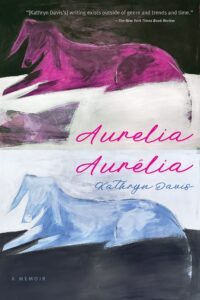
Kathryn Davis, Aurelia, Aurélia
Graywolf, March 1
Kathryn Davis’ first memoir is recognizably hers—place-based, with hints of magical realism, about journeys, movement—but is by necessity much more personal than her fiction. She writes about being a teenager, trying on identities like clothes, and about being in late middle age, resolutely someone, and yet still wondering, still trying on the other clothes, even while liking her own. At the memoir’s center is the death of her husband, and her reflections about the life they lived together. By turns grieving and joyful, the book explores the pivotal crossroads in her life, and takes us along as she continues the journey. –JH
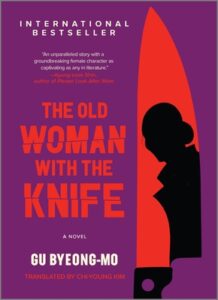
Gu Byeong-Mo, tr. Chi-Young Kim, The Old Woman with the Knife
Hanover Square Press, March 1
A sixty-five-year-old female assassin, need I say more? Byeong-Mo’s novel follows Hornclaw, the aforementioned female assassin who finds herself on the cusp (or rather, the expectation) of retirement. But when an injury leads her to a doctor and his family, her own feelings and emotions come up to the surface, and with them, a new kind of stake. The Old Woman with the Knife, Byeong-Mo’s first novel to be translated into English from Korean, is sardonic and funny, as it probes at the expectations around aging women and their bodies. –SK
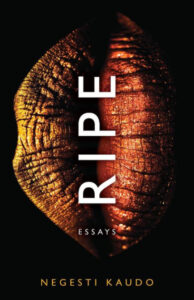
Negesti Kaudo, Ripe
Mad Creek, March 2
A debut essay collection from an exciting new voice, Negesti Kaudo’s Ripe probes topics of race, class, sexuality, and more through cultural criticism and her experiences as a young Black woman in the Midwest. It joins the ranks of other recent collections on intersectionality such as Hood Feminism and Against White Feminism, a must-read contemporary canon. –ES
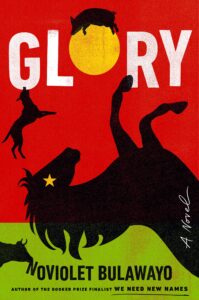
NoViolet Bulawayo, Glory
Viking, March 8
In 2013, NoViolet Bulawayo took the world by storm with her incredible debut, We Need New Names. (It has been argued that that book is actually one of the best debuts of the decade, a sentiment that I wholeheartedly agree with.) Now, the Booker-prize finalist is back. Glory is set in a fictional place, at a familiar time of turmoil. Inspired by the 2017 coup that saw the fall of Zimbabwe’s president, Glory starts with the dethroning of Old Horse, a leader no more. Through the voices of the animal kingdom, we are shown a nation on the precipice. NoViolet Bulawayo has an unmatched ability to enchant the trials and tribulations of life lived in a nation in turmoil. In the past, she has done this through the eyes of the children. In this one, through animals. Like all good allegories, Glory is sure to be an impressive feat of imagination and a haunting reflection of reality. –KY
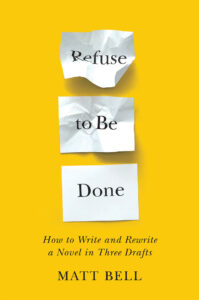
Matt Bell, Refuse to Be Done
Soho Press, March 8
The subtitle of this one—”How to Write and Rewrite a Novel in Three Drafts”—is about as compelling a pitch as I can imagine. I struggle mightily with revision, so I’m excited to read Bell’s “encouraging and intensely practical” craft book. –JG
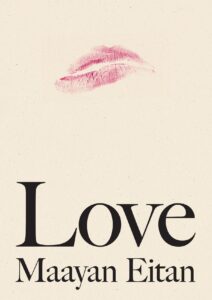
Maayan Eitan, Love
Penguin Press, March 8
Maayan Eitan’s debut follows Libby, a young sex worker looking for, yes, love. Through a series of short fragments, Libby tests out different narratives about her life and past. Last year, Love was a “literary sensation in Israel”; let’s see what it does here. –WC
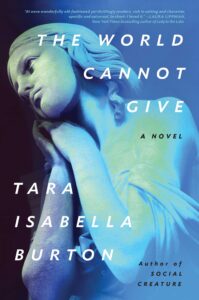
Tara Isabella Burton, The World Cannot Give
Simon & Schuster, March 8
Burton’s second novel is just as deliciously involving as her debut Social Creature, but makes rather better use of her doctorate in theology and ongoing religious scholarship. It is set at a tiny academy in Maine, where a sensitive teenager obsessed with an obscure novel—whose author, a student at the school, died at 19—falls in with a cultish church choir of boys, led by the brutal and neurotic Virginia. It’s a book about the nature of and limits of fervor, religious, sexual, and otherwise, and a spellbinding coming of age story that—despite being set in the Instagram-laden present—feels somehow plucked out of time. –ET

Stewart O’Nan, Ocean State
Grove, March 8
This is a book about murder, but it is not a mystery. Well, there’s mystery, but not in the whodunnit sense. In the first line we are told who died, and who killed them; what expands from that immediate reveal is the slow unraveling of why. The story centers on the killer and her family, her mother, her sister, and all the tangled lives and actions that one by one, add up to the final tragedy. This is a beautiful, devastating novel of family and young love, and unredeemable acts. –JH
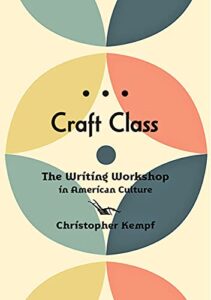
Christopher Kempf, Craft Class: The Writing Workshop in American Culture
Johns Hopkins University Press, March 15
As of 2016, there are over 350 creative writing MFA programs in the U.S.; 40 years prior, there were only 52. Nearly all operate on the workshop model. Poet Christopher Kempf places the idea of the artisanal workshop in its capitalist historical context, taking the craft/labor metaphor as its central question: in the “workshop,” what type of work is being done? And what are the contradictions that arise when writing, like other artisanal goods, is evaluated as both labor and not-labor? Worthwhile if you’re a creative writer—or reader. –WC
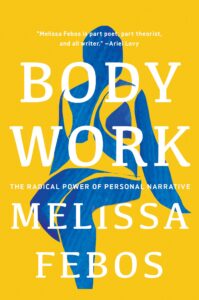
Melissa Febos, Body Work: The Radical Power of Personal Narrative
Catapult, March 15
If I could do cartwheels, I would have cartwheeled across the room when I learned that the brilliant Melissa Febos is gifting us with a memoir craft book. One of my all-time favorite writers and thinkers, Febos draws on her own life trajectory to discuss matters of so-called navel-gazing, writing about others, and “the power of divulgence.” I can’t wait to dive in to this one. –ES
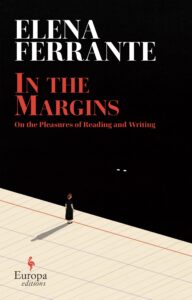
Elena Ferrante, tr. Ann Goldstein, In the Margins
Europa Editions, March 15
There is so much mystery shrouding the beloved Italian author, Elena Ferrante. For years, readers and scholars have gone on some deep dives, trying to pinpoint the writer’s identity. If you, too, have wondered who exactly penned My Brilliant Friend, hopefully it comes from a place of deep admiration. The latest book from Elena Ferrante, translated by Anne Goldstein, is sure to answer some of your questions. Who is Elena Ferrante as a reader? As a fellow writer, struggling against the page? Who have been her influences? In the Margins is that rare peek inside the lively mind of one of our most influential writers working today. –KY
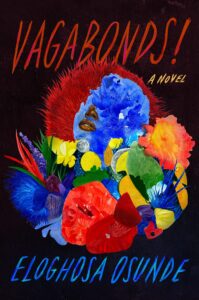
Eloghosa Osunde, Vagabonds!: A Novel
Riverhead, March 15
Plimpton Prize winner and consistently thought-provoking Paris Review columnist Eloghosa Osunde’s debut novel catalogues the lives of an ensemble cast of vagabonds, “for whom life itself is a form of resistance,” before bringing them all together for the event of a lifetime. Said Osunde, writing Vagabonds! “relocated [her] to a place where imagination meets courage.” –WC
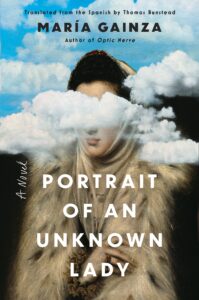
María Gainza, tr. Thomas Bunstead, Portrait of an Unknown Lady
Catapult, March 22
Gainza’s Optic Nerve was one of my favorite novels of 2019 (when it was first published in English), so I’ve been anxiously awaiting this follow-up. Like Optic Nerve, Portrait of an Unknown Lady is intelligent and tensile, if mostly plotless, taking place in the world of art and those who both appreciate and make it, though here the narrator is not tracing her own life through art, but rather the life of a famous (or infamous) Argentinean counterfeiter, the truth of whom eludes her. She interviews acquaintances, sifts through court records, and even reproduces an auction catalogue; the result is a loose investigation into the nature of art and of memory, scattered with gems of intrigue and insight. –ET
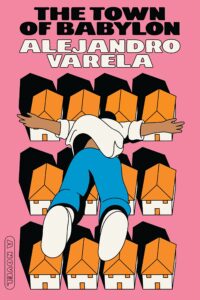
Alejandro Varela, The Town of Babylon
Astra House, March 22
It’s hard to imagine a scene riper for drama and psychological exploration than a twenty-year high school reunion: that’s where we find protagonist Andrés, a professor, in The Town of Babylon, Alejandro Varela’s debut novel. As Andrés reckons with figures from his past, his story also becomes an inquiry into the ways that queerness, race, and class affect the course of one’s life. –CS
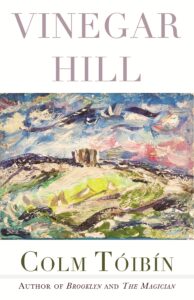
Colm Tóibín, Vinegar Hill: Poems
Beacon Hill Press, March 22
Tóibín’s collection of poems rests at the wedge between the private and the public. Whether it be queer love or COVID or religion, whether they move through Dublin or Venice or Enniscorthy, Tóibín situates his poems at an interstice, lacing them with threads of both humor and emotion. Written over the course of many decades, his first poetry collection is an extension of the themes of his novels, explored via the malleability of verse. –SK

Candice Wuehle, Monarch
Soft Skull, March 22
Wuehle has published three poetry collections, and as a sucker for a poet novel, this is a major selling point for me. Her debut novel “merges iconic true crime stories of the ’90s (Lorena Bobbitt, Nicole Brown Simpson, and JonBenét Ramsey) with theories of human consciousness, folklore, and a perennial cultural fixation with dead girls.” Sold. –JG
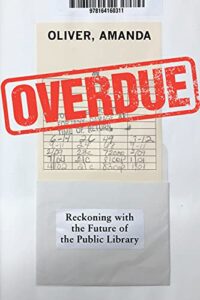
Amanda Oliver, Overdue: Reckoning with the Public Library
Chicago Review Press, March 22
Part memoir, part ode, part indictment, Overdue is the firsthand story of Amanda Oliver’s life as librarian, starting with her first day on the job as an eager young professional in an underserved neighborhood in Washington, DC. What Oliver slowly discovers is that—despite the fact they do indeed offer hope and opportunity to so many who wouldn’t otherwise have it—libraries nonetheless mirror all of the deep systemic problems contained in American society. How can libraries repair their own institutional fault lines around racism and economic oppression, wonders Oliver. How can libraries survive America? –JD
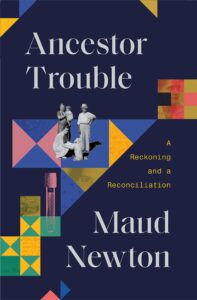
Maud Newton, Ancestor Trouble
Random House, March 29
In her new memoir, Maud Newton plumbs the depths of the multibillion-dollar industry of ancestral research in an effort to make sense of her own family history, which is peppered with stories both bizarre and traumatic. Newton doesn’t avoid the sins of her kin—including their involvement in slavery and genocide—in this intricately researched account of the most universal subject. –ES
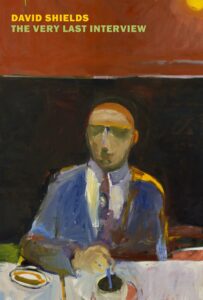
David Shields, The Very Last Interview
NYRB, March 29
It’s been a dozen years since Shields published Reality Hunger, his controversial “manifesto” of the literary remix, which I first loved, and then pooh-poohed, and then sort of loved again, but regardless have continued to think about ever since. This new book is a return to the Reality Hunger energy: the portrait of a writer as an interview subject, made up of the thousands of questions Shields has been asked over the last twenty-five years—reorganized, rewritten, and with their answers entirely omitted. The result is sometimes annoying, sometimes funny, sometimes existentially provoking—like a self-deprecating Lyn Hejinian’s My Life for writers. –ET
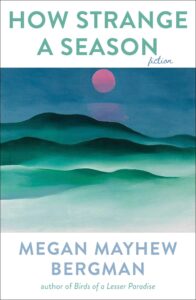
Megan Mayhew Bergman, How Strange a Season: Fiction
Scribner, March 29
Megan Mayhew Bergman is one of the best authors out there for chronicling our tangled, intimate, complicated relationship to the natural world; her elegant, lyrical prose documents an evolving crisis and our incorrigibly human responses to it. She’s published widely on the climate crisis for outlets including The Guardian and The Paris Review in addition to authoring Almost Famous Women and Birds of a Lesser Paradise, among the rest of her extensive work. Now, I’m eagerly awaiting her new collection—consisting of short stories and a novella—which features characters as they navigate landscapes natural and emotional and reckon with the echoes of history in their daily lives. –CS
APRIL
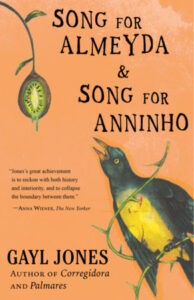
Gayl Jones, Song for Almeyda and Song for Anninho
Beacon, April 5
This year has seen renewed interest in Gayl Jones, whose novels were first published in the mid-1970s to critical acclaim. Toni Morrison was an advocate of Jones and praised the manuscript of 1975’s Corregidora: “No novel about any black woman could ever be the same after this.” Yet Jones disappeared from the public eye in 1998—why? Perhaps that answer is not as important as why Jones’s work is considered a touchstone of Black American literature. This volume of poetry, set in the late 17th century, revisits the characters introduced in Palmares—Almeyda and Anninho. This decolonial love story in verse adds to the impressive oeuvre of Jones. –VW

Jennifer Egan, The Candy House
Scribner, April 5
Fans of A Visit to the Goon Squad (me) will not be disappointed by this “sibling novel,” in which Egan returns to the structure (interconnected but discrete sections in an impressive variety of styles—tweets instead of PowerPoint this time) and some of the characters of her Pulitzer Prize winning 2011 novel. In fact, she justifies her form even further here—many of the sections touch on the consequences of a new tech innovation, “Own Your Unconscious,” which allows users (i.e. everyone) to export their experiences and then (of course) upload them to the cloud for all to share. But more interesting—and this, really, is Egan’s point—is the humanity of this novel, the way in our lives, too, are interconnected but discrete, and how they fit together. It is very good. –ET

Ludwig Wittgenstein, tr. Marjorie Perloff, Private Notebooks
Liveright, April 5
Initially written in code during WWI and translated for the first time in English by Perloff, Wittgenstein notebooks contextualize the early years of his Tractatus-Logico-Philosophicus. Starting with the summer of 1914, when Wittgenstein finds himself a soldier in the Austrian army, the notebooks consider his sexuality and explore the formations of analytical philosophy, as they pertain to the looming instances and potential of death of the early 20th century. –SK
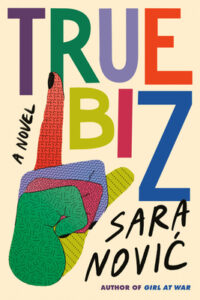
Sara Nović, True Biz
Random House, April 5
“True biz” is an exclamation in American Sign Language: really, seriously, definitely, real-talk. Novic’s second novel is a coming of age story set at the River Valley School for the Deaf, where students Austen and Charlie, and CODA (child of deaf adults) headmistress February learn to navigate their place in the world. With a television adaptation optioned, this is an incredible story of sign language, disability rights, first love, and loss. –EF
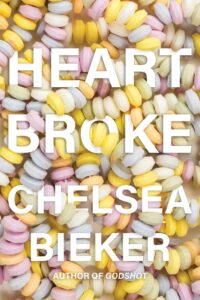
Chelsea Bieker, Heartbroke: Stories
Catapult, April 5
If you haven’t yet read Chelsea Bieker’s Godshot, you have a few months to do so before her debut story collection hits. If you have read her cult classic (wink wink), and you’re still thinking about it, you’re in luck. The characters you will encounter in Heartbroke are sure to be just as unforgettable. Set against the backdrop of sunny California, in these stories, you will encounter: teenagers flirting with danger, an entrepreneurial mother–son duo, a phone sex operator, a very sad kidnapper. Chelsea Bieker is back, baby! –KY

Emily St. John Mandel, Sea of Tranquility
Knopf, April 5
Readers of Mandel’s Station Eleven and The Glass Hotel will not be disappointed by her latest, a generous and elegant novel about art and family and time travel—in fact, they will be particularly rewarded by the way the three texts intersect. I won’t say more about that, except to note that it was a strange experience, reading this book in a pandemic—certain passages made me shudder, but others gave me solace. After all, no matter what happens, time, at least as Mandel sees it, will go on. –ET
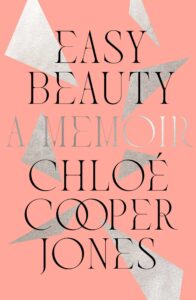
Chloé Cooper Jones, Easy Beauty
Avid Reader Press, April 5
This memoir about disability and motherhood spans the globe – from “life in Brooklyn to sculpture gardens in Rome; from film festivals in Utah to a Beyoncé concert in Milan; from a tennis tournament in California to the Killing Fields of Phnom Penh.” Cooper Jones challenges the unspoken social taboos about the disabled body, unpacking myths of beauty and our complicity in upholding those myths. Blending journalism, philosophy, and memoir, it’s a book that everyone will be talking about this Spring. –EF
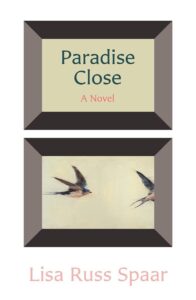
Lisa Russ Spaar, Paradise Close
Persea, April 5
It seems like all of of my favorite novelists are also poets, and so as an enormous fan of Lisa Russ Spaar’s lush, ecstatic poetry, I can’t wait to read her first (!) novel, a book about outcasts and exiles that Eleanor Henderson described as “a soulful, sexy, extraordinarily lyrical meditation on things that matter―art, aging, love, desire, the body, and the brief, passionate encounters that bind us to each other and sometimes save our lives.” Perfect, I suspect, for reading in the garden this season. –ET
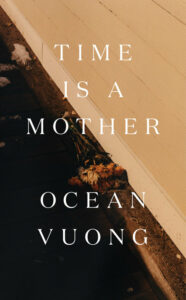
Ocean Vuong, Time Is a Mother
Penguin Press, April 5
When Night Sky With Exit Wounds came out over five years ago, it was a revelation. When On Earth We’re Briefly Gorgeous hit shelves two years after that, it was every bit as breathtaking. All of Ocean Vuong’s writing shows a masterful attention to detail. He comes at language with a magnifying glass. He holds words differently than everyone else, and when he hands them to you, they are changed. Now Ocean Vuong returns to poetry with his second collection. Dealing with the death of his mother, this new book comes from a place of grief and memory, turning loss over and over in a way that only this writer can. You’ll want to read this latest addition to his oeuvre immediately. –KY
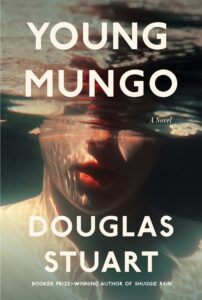
Douglas Stuart, Young Mungo
Grove, April 5
Booker-prize winner Douglas Stuart’s second novel is another a vivid story of working-class Glaswegian life. The emotional and suspenseful story follows two young men, Mungo and James, as they fall in love against all odds, amidst hypermasculinity, violence, and sectarianism. Stuart’s debut, Shuggie Bain, was universally loved; a heart-wrenching story of a young boy and his alcoholic mother. Young Mungo promises to be as unforgettable and powerful, revealing the violence faced by many queer people, and the dangers of loving someone too much. –EF
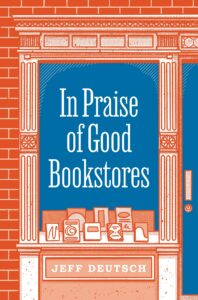
Jeff Deutsch, In Praise of Good Bookstores
Princeton University Press, April 5
As though it hadn’t already hooked you from the title, In Praise of Good Bookstores is also written by Jeff Deutsch, director of the well-beloved Seminary Co-op Bookstores in Chicago—the first not-for-profit bookstore in the US and one renowned for its unique collection of academic titles. Deutsch ties his love of bookstores, reading, and knowledge to Jewish traditions of education and reflection, which also resonates with the rich literary tradition that Jewish writers developed in Chicago during the early and mid-20th century. If you’re still reading this blurb, by far the nerdiest one I’ve ever written, then we should both read this book. –CS
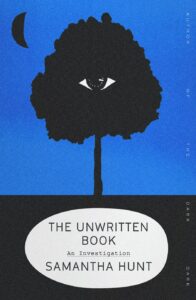
Samantha Hunt, The Unwritten Book: An Investigation
FSG, April 5
The Dark Dark pushed the boundaries of what one could do with short fiction, so I’m particularly excited to check out Samantha Hunt’s first foray into nonfiction. Well, a “genre-bending work of nonfiction,” but we should expect nothing less. In The Unwritten Book, books = ghosts. Reading is a way of talking to the dead. Remembering stories is a way of being haunted by them. Fuelled by the discovery of her father’s unfinished manuscript, Samantha Hunt is on the hunt (sorry) for clues about all that is left unsaid. Part literary criticism, part memoir, part family history, this new book explores the things that have a hold on us. I, for one, am ready to be haunted by Samantha Hunt once again. –KY
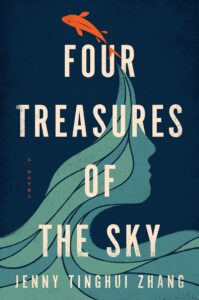
Jenny Tinghui Zhang, Four Treasures of the Sky
Flatiron, April 5
In Zhang’s debut novel, set in the American West of the 1880s but shot through with Chinese folklore and calligraphic references, a 13-year-old girl is kidnapped from a Chinese market and brought to San Francisco. Under the shadow of the Chinese Exclusion Act, she makes her way to Idaho, passing as a boy to survive, but hoping, despite everything, to do more than that. –ET
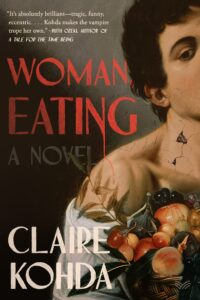
Claire Kohda, Woman, Eating
HarperVia, April 12
You might think the time for vampire novels has come and gone, but you clearly wouldn’t be imagining this one. Woman, Eating is about the every-girl: Lydia scrolls on Instagram, loves Buffy the Vampire Slayer, likes to paint, misses her mom, has a crush on a cute boy—and she’s hungry. Boy, is she hungry. But even though the food she craves is the food we crave: sushi, ramen, ice cream, cake, the only food she can ingest is blood. Why? Because she’s a vampire, of course, just not your typical version. Lydia is overwhelmed with the same thoughts that plague the normal human—about identity, her father’s race and culture and what it means for her, how to be, how to live—and yet to top it all off she has to deal with the whole question of eating. Can she have it both ways? –JH
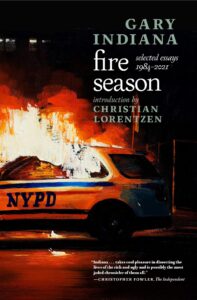
Gary Indiana, Fire Season: Selected Essays, 1984-2021
Seven Stories Press, April 12
Even if you don’t agree with him, the iconic Gary Indiana is always worth your time. This collection of his essays contains, as the publisher puts it “sometimes bitchy, always generous, erudite, and joyful assessments from the last thirty-five years of cutting-edge film, art, and literature.” Sounds about right. –ET
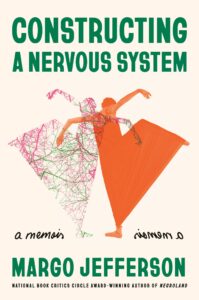
Margo Jefferson, Constructing a Nervous System
Pantheon, April 12
Jefferson (Negroland) excavates inner truths in this memoir about pivotal life moments. Using the structure of a nervous system as a framework, Jefferson approaches the subject of physicality as a state of wonderment. The book’s approach to storytelling is surprising and refreshing, allowing Jefferson to experiment with literary convention. Our identities are often comprised of our responses to the world around us; art and other forms of creative expression can serve as blueprints for transcendence. I look forward to seeing how Jefferson is able to unify—or rather fuse divergent fragments—into a body of kinetic energy. –VW
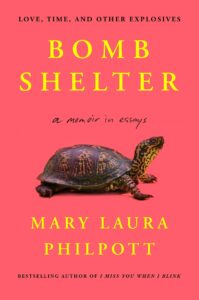
Mary Laura Philpott, Bomb Shelter: Love, Time, and Other Explosives
Atria, April 12
“If this happened, what else could?” The thought first arrives when historically sunny, glass-half-full Philpott finds her teenage son unconscious in his room. This world-shaking event forces Philpott to reorganize everything, including her own thoughts and her relationship to faith. In this memoir in essays, “If this happened, what else could?” becomes a refrain. But ultimately, Bomb Shelter serves as a kind of balm: While recognizing the unpredictable, the random, unstoppable forces of life, Philpott gently guides the reader with humor and familiarity through life’s terrain, letting her readers know if she can do it, we can do it. –JH
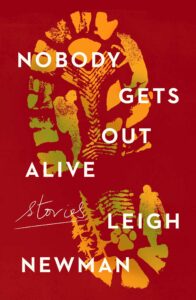
Leigh Newman, Nobody Gets Out Alive: Stories
Scribner, April 12
In these stories, all set in Newman’s home state of Alaska, women seek survival, connection, home and safety, their quests tinged with the wildness of the state, the unknowability of the landscape, as well as the male-dominated culture that’s prevailed there for decades. The tales span the last century, some taking place in the Last Frontier, some in the early years of the 20th century; all are stunningly crafted, and make it impossible to think of moving on to the next story and leaving behind the character in question, until you do, and find that each is better than the last. –JH

Tajja Isen, Some of My Best Friends
Atria/One Signal, April 19
Catapult editor Tajja Isen is ready to call everyone on their bullshit. If liberal industries can call out institutionalized racism, why can’t we actually change it? Blending inviting personal essay with biting cultural critique, Some of My Best Friends takes readers to the uncomfortable space between what Nice White People intend and the inaction rooted in our society. These essays explore the problems of representation in Hollywood, the blinding whiteness of the literary industry, and band-aids companies attempt to stick to the wound. It’s time to rip the band-aid off. It’s time to read Tajja Isen and dare to dream of a better place. –KY
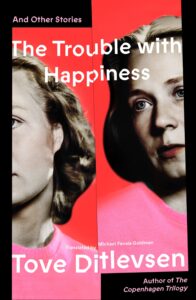
Tove Ditlevsen, tr. Michael Favala Goldman, The Trouble with Happiness: And Other Stories
FSG, April 19
Last year’s best book of the year (according to The New York Times and me) was Tove Ditlevsen’s Copenhagen Trilogy. Now her short stories are available for the first time in English. These “poignant and understated stories” have the same pared down voice and incredible authority of the memoir (and, according to her translator, these stories sometimes mine her own life for material, with some stories appearing “to be extrapolations of scenes that are mentioned only briefly in her memoirs.”) You can read one of the stories, “The Umbrella,” that was published in The New Yorker, and grab the rest in April! –EF
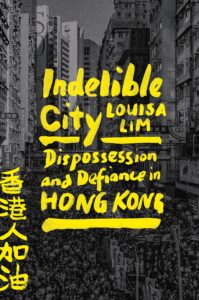
Louisa Lim, Indelible City: Dispossession and Defiance in Hong Kong
Riverhead, April 19
Lim’s book, covering the key moments in Hong Kong’s history—from the 1842 British colonization to the 1997 British-Chinese negotiations—centers Hong Kong in its own narrative, highlighting guerilla calligraphers, amateur historians, and street artists who make up the place. At the heart of it is the King of Kowloon, the street artist whose work shapes and is shaped by the larger identity of Hong Kong, from being unseen to seen, unheard to heard. –SK
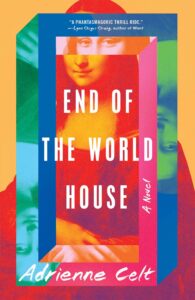
Adrienne Celt, End of the World House
Simon & Schuster, April 19
Best friends go to Paris at the end of the world—which sounds good to me already, but then you discover that the end of the world turns out to be resisting itself . . . by means of a time loop. I suppose you could be in worse places for eternity than the Louvre, but I’ll still be reading to find out what happens. –ET
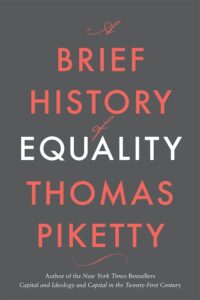
Thomas Piketty, A Brief History of Equality
Belknap Press, April 19
I am sure much smarter people than me are poised to consider this book—which is, as the title suggests, a précis of Piketty’s full body of work around the subject of equality, and its evil twin, inequality—in conversation with David Wengrow and the late David Graeber’s riotously fun The Dawn of Everything. Though they arrive at it through different means and modes of scholarship, Piketty and the Davids seem to come to the same conclusion: “Guys, wtf, it doesn’t actually have to be like this.” To which I say, YES. –JD
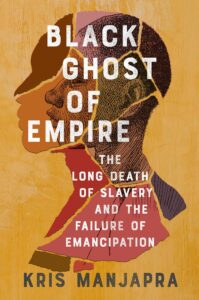
Kris Manjapra, Black Ghost of Empire: The Long Death of Slavery and the Failure of Emancipation
Scribner, April 19
Manjapra’s book traces the unfinished work and process of emancipation in the Atlantic world. Highlighting the movements that began in the 1770s and and ended in the 1880s, Manjapra examines the Gradual Emancipations of North America, the Revolutionary Emancipation of Haiti, the Compensated Emancipations of European overseas empires, the War Emancipation of the American South, and the Conquest Emancipations of sub-Saharan Africa, in order to investigate the ways in which such abolition processes ultimately sanctioned violence against Black communities and affirmed white supremacy. In the context of these unfinished processes, Manjapra considers the ways in which grassroots Black activists have become the stewards of care and recovery, for both the past and the present. –SK
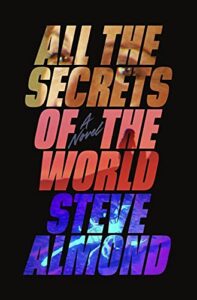
Steve Almond, All the Secrets of the World
Zando, April 19
I still remember reading “Donkey Greedy, Donkey Gets Punched” in the Best American Short Stories 2010 as a child, and being stunned by its use of graphics (now, I’d be stunned by other elements). Now, over a decade and many short stories (and nonfiction works) later, Steve Almond is finally releasing his debut novel. In it, two girls are paired together for the science fair, setting off a chain reaction that sends one of them through the desert and into the criminal justice system. Zando says the book is Little Fires Everywhere meets Breaking Bad—that can’t be boring. –WC
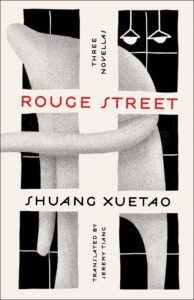
Shuang Xuetao, tr. Jeremy Tiang, Rouge Street: Three Novellas
Metropolitan Books, April 19
This collection of three novellas moves readers from an inventor of dreams to a criminal stuck under a frozen lake to a strange, strange girl. Set in Shenyang, a post-industrial city in the northeast of China, Xuetao’s novellas are as beautifully frigid and gritty as the city he writes about, as he inspects the dust left following an economic boom, and the things that percolate in spite of lost and unfulfilled promise. –SK
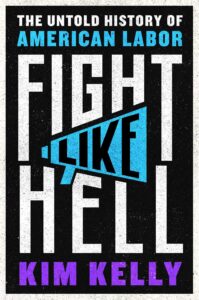
Kim Kelly, Fight Like Hell: The Untold History of American Labor
Atria/One Signal Publishers, April 26
I first became aware of Kim Kelly due to her excellent reportage as a labor columnist for Teen Vogue. In Fight Like Hell, Kelly promises the same type of hard-hitting, nuanced coverage we’ve become accustomed to. Kelly’s coverage of the history of the American labor movement doesn’t rely on the whitewashed, oft-repeated narratives that populate the pages of school textbooks. –VW
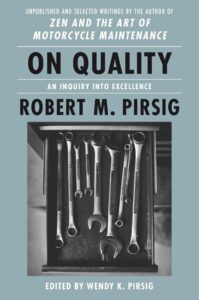
Robert M. Pirsig, ed. Wendy K. Pirsig, On Quality: An Inquiry into Excellence: Unpublished and Selected Writings
Custom House, April 26
Attention all Zen and the Art of Motorcycle Maintenance acolytes (or ex-acolytes): the unpublished writings of Robert M. Pirsig, who died in 2017, will soon be available for public consumption, thanks to the efforts of Wendy K. Pirsig, the author’s wife of 40 years, who edits and introduces the collection. Will 2022 be the year that MOQ comes back? Only time will tell. –ET
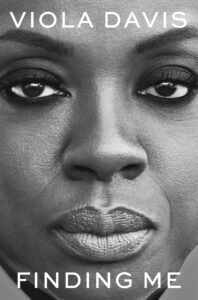
Viola Davis, Finding Me
HarperOne, April 26
From How to Get Away with Murder to Ma Rainey’s Black Bottom, you’ve seen Viola Davis. You know Viola Davis. But do you really? One of six children, daughter to an alcoholic/horse trainer and a factory worker/civil rights activist, Viola Davis grew up in poverty in South Carolina and Rhode Island. Finding Me takes us from the hardships of those early days to the possibilities of stage. When asked by Oprah Daily what inspired her to write this book, she said, “It’s my way of helping people feel less alone in a world that’s so isolating.” What better reason than that? –KY
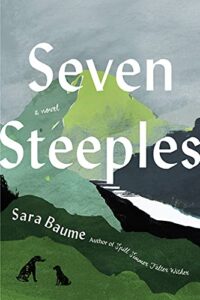
Sara Baume, Seven Steeples
Mariner Books, April 26
The second book from the author of Spill Simmer Falter Wither is a lyrical meditation on nature and companionship, following two people who give up on their disappointing, conventional lives, and retreat from everything, disappearing into the Irish countryside. As the kids say: goals. –ET
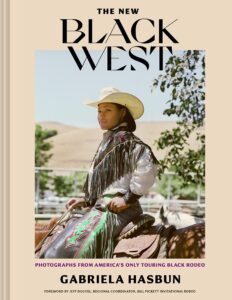
Gabriela Hasbun, The New Black West: Photographs from America’s Only Touring Black Rodeo
Chronicle Books, April 26
For years photographer Gabriela Hasbun has been documenting the annual Bill Pickett Invitational Rodeo in the hills outside Oakland, which brings together a community of Black cowboys whose very existence flies in the face of America’s old myths of the West. Hasbun’s beautiful photographs of contemporary Black rodeo riders—and their families, their celebrations—honor a rich legacy too often ignored by the wider world. –JD
MAY
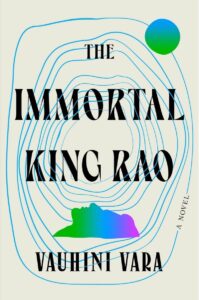
Vauhini Vara, The Immortal King Rao
W.W. Norton, May 3
Vauhini Vara’s debut novel follows Athena, a young woman accused of killing her father—a tech mogul who grew up on a Dalit plantation and became the most powerful person on earth through the force of his corporate-led government. The book grapples with the effects of capitalism as well as technological development on politics, families, and memory itself, and it seems sure to be an engrossing read. –CS

Lillian Fishman, Acts of Service
Hogarth, May 3
By May, we’re going to be in dire need of some sexy fiction (birds, bees, long Covid winter, etc.) and this is the debut to which I shall turn. It’s picking up all the right comparisons—Sally Rooney, Ottessa Moshfegh, Joan Didion—and the right blurbs—Raven Leilani, Gary Shteyngart, Sheila Heti—but it’s actually Edmund White’s endorsement that has me the most curious: “This fascinating novel, which will be read as a defense of libertinism, paradoxically turns out to be a book of exquisite moral refinement and almost intimidating elegance,” he writes. Clearly I will be reading that. –ET
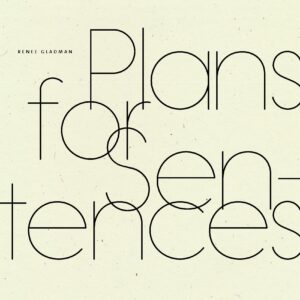
Renee Gladman, Plans for Sentences
Wave Books, May 3
Text and drawing, drawing and text all collapse into one another in Gladman’s new interdisciplinary collection. Pushing the boundaries of the visual and the textual, Gladman considers the ways in which the two practices can invent and reinvent one another, offering a limitless and circular plunge into the idea of poetry. Indeed, like most of her work, language feels endless and infinite, lingering even after we put the book back on the shelf. –SK
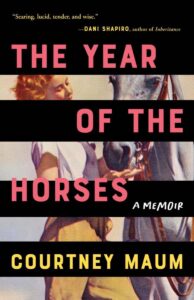
Courtney Maum, The Year of the Horses: A Memoir
Tin House, May 3
I was sold at Courtney Maum and “horses,” TBH, but pleasantly surprised to learn about the other threads in this one: Maum’s experience of reckoning with depression, plus historical portraits of other horseback-riding ladies. Saddle up, we’re going riding. –ES
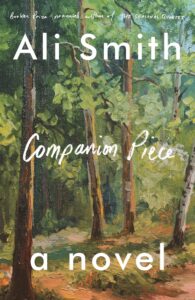
Ali Smith, Companion Piece
Pantheon, May 3
The first time I fell in love with Ali Smith was in college, when a professor handed me his copy of The First Person and Other Stories (on loan; he was very clear!) and said it was required reading. I had never seen stories move like that. She writes with an unshakeable confidence. She runs to the bizarre. She is distinctly experimental. She has proven her dedication to the experimental time and time again, most recently with her Seasonal Quartet series, which she wrote in real-time, dipping into world events like #MeToo and Brexit as they were unfolding. Even the pandemic catches up to us in her fiction. In Companion Piece, Ali Smith asks: What’s next? The future may be uncertain, but one thing is for sure: I will follow Ali Smith to the ends of the earth. –KY
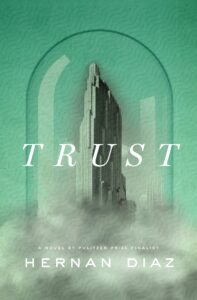
Hernan Diaz, Trust
Riverhead, May 3
Hernan Diaz’s 2017 debut novel, In the Distance—an unconventional western about a lonely Swedish immigrant traversing America’s frontier in the 1800s—was one of the great indie press success stories of recent years. Released by small-but-mighty Minneapolis publishing house Coffee House Press, In the Distance won a bevy of major literary awards, was a finalist for the Pulitzer Prize and the PEN/Faulkner Award, and, most significantly, was named one of the 20 Best Novels of the Decade by the team here at Lit Hub. All that is to say: expectations are high for Diaz’s follow-up, a literary puzzle box about the mystery surrounding a wealthy Manhattan couple during the Roaring Twenties and Great Depression. –DS
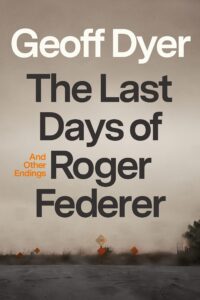
Geoff Dyer, The Last Days of Roger Federer: And Other Endings
FSG, May 3
Geoff Dyer is excellent at writing toward a thing while writing around it, and looking at a subject through his own cracked lens—please see his masterpiece Out of Sheer Rage, a biography of D.H. Lawrence in the form of a book about failing to write a biography of D.H. Lawrence—so I am very interested to see what he will do here. The Last Days of Roger Federer is not a biography (failed or otherwise) of the tennis player, but rather an examination of the twilight days of famous artists, writers, musicians and athletes Dyer has loved, intertwined with his own experience of aging. I have very high expectations, and hopes. –ET
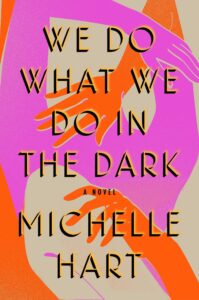
Michelle Hart, We Do What We Do in the Dark
Riverhead, May 3
In Michelle Hart’s full-length debut, a college freshman grieving her mother meets a much older, married woman at the gym and begins an affair with her. Years later, she grapples with the effects of that formative relationship. –WC

John Waters, Liarmouth
FSG, May 3
A “perverted feel-bad romance” from the beloved Baltimorean pope of trash? A revenge road-trip novel by the man who gave us Cry-Baby, Cecil B. Demented, and one of the all-time great Simpsons cameos? Waters’ debut novel is still (somewhat) shrouded in mystery, but the brief description available makes it sound pretty damn tantalizing: “Marsha Sprinkle: Suitcase thief. Scammer. Master of disguise. Dogs and children hate her. Her own family wants her dead. She’s smart, she’s desperate, she’s disturbed, and she’s on the run with a big chip on her shoulder.” Sign me up. –DS
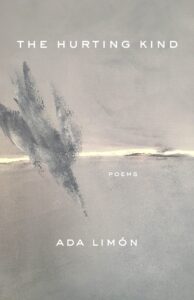
Ada Limón, The Hurting Kind
Milkweed Editions, May 10
Ada Limón needs no introduction, but I’ll put one here just in case: A National Book Award finalist and an NBCC Award winner, she is the author of the heartstopping poetry collections Bright Dead Things and The Carrying. In The Hurting Kind, she touches on the pain of living in the world today (the wounds of the natural world, the pandemic between us), but it is not all sorrows. There is a levity to some of these lines. You don’t have to look hard to see the joy and the small celebrations of the things that bind us to one another. The Hurting Kind is a book composed of our connective tissue. –KY

Marissa Moss, Her Country: How the Women of Country Music Became the Success They Were Never Supposed to Be
Henry Holt, May 10
Contemporary country music is awash in oversized pick-up trucks and flag-draped barns, dudes in honky tonks and girls in cowboy boots—so much of it sounds like Foghorn Leghorn squeezed into the body of an 18-year-old super-patriot who just wants to fight and fuck because it’s Friday night. According to Marissa R. Moss’s Her Country, in 2021 only 16 percent of country music played on the radio was by women, despite the fact we’re now blessed with the brilliance of singer-songwriters like Kacey Musgraves, Maren Morris, and Brandi Carlile. Though women regularly pack arenas and release massive crossover hits, it’s still men who get the airplay and the awards… So what the hell is going on? Her Country is a fascinating look at the weird isolationism of contemporary country. –JD
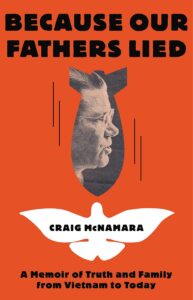
Craig McNamara, Because Our Fathers Lied: A Memoir of Truth and Family, from Vietnam to Today
Little, Brown, May 10
This is the story of the Vietnam war though a single family—but an unusual one: Craig McNamara’s father was Robert McNamara, John F. Kennedy’s Secretary of Defense and the architect of the Vietnam War. Craig himself failed his draft board physical, joined anti-war demonstrations, and drove a motorcycle across Central and South America before deciding to become a walnut farmer in Northern California. This should be a personal and enlightening look at a period that still fascinates after so many years. –ET
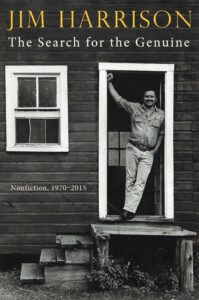
Jim Harrison, The Search for the Genuine: Selected Nonfiction
Grove, May 10
For the first time in 30 years, Grove is publishing a collection of the legendary Jim Harrison’s nonfiction essays and articles. Featuring some pieces never before published, this is the writer in all his mastery: taking on topics such as Buddhism, grouse hunting, and the US/Mexico border. Harrison may be gone, but his writing speaks to a force larger than life: it continues to teach and inform years later, which is all a writer could ever really dream of. –JH
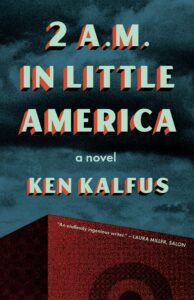
Ken Kalfus, 2.A.M. in Little America
Milkweed Editions, May 10
For some reason, Ken Kalfus is American literature’s best-kept secret: his ideas are weird, his writing is limber, his ironic eye is gimlet, and yet no one seems to talk about him. Maybe that will change with this novel, set in an immigrant-intolerant future that sounds all too plausible. But either way, I’ve been waiting for a new novel from him since the 2013’s insane, high-concept Equilateral, and I can’t wait to dig in. –ET
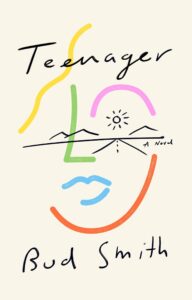
Bud Smith, Teenager
Vintage, May 10
I like the short stories of Bud Smith. I also like the Twitter account of Bud Smith, who works in heavy construction. We could use more novelists who don’t work in publishing or academia (I’m not suggesting those aren’t “real” jobs, but they offer a very particular and limited perspective of life in America). What I’m saying, really, is that we could use more writers like Bud Smith. Teenager is a lovestruck, cross-country road-trip novel following a couple of ill-starred delinquents on the run from the olds; and though we have plenty of novels that tell that story, this is the only one we have from Bud Smith. And that’s good. –JD

Maggie Shipstead, You Have a Friend in 10A
Knopf, May 17
My first Shipstead, Great Circle, was a highlight of my 2021 reading, so while I’m catching up on her backlog, I’ll also be adding her debut story collection to the rotation. Slated subjects include a tragic honeymoon, a love triangle in Montana, and escape from a cult. –ES
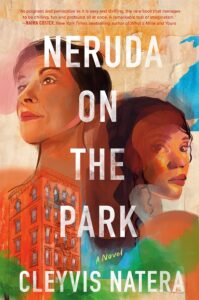
Cleyvis Natera, Neruda on the Park
Ballantine, May 17
Natera’s debut novel follows the Guerreros, who live in Nothar Park, a largely Dominican neighborhood of New York facing gentrification. Moving from Eusebia, a community elder who schemes to prevent luxury condos from encroaching on the neighborhood to her daughter Luz, an associate at a Manhattan law firm, the novel is a tapestry of family, love, sacrifice, and loss. –SK
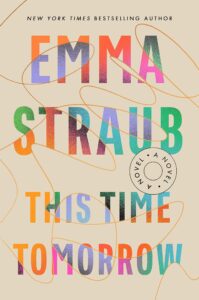
Emma Straub, This Time Tomorrow
Riverhead, May 17
I’m a sucker for a time travel plot, and Emma Straub’s latest novel, in which a 40-year-old woman returns to the day of her 16th birthday, promises to play to Straub’s strengths: Warm, poignant family stories heavy on charm and compassion. Mostly, it sounds like tremendous fun. Yes, please. –JG
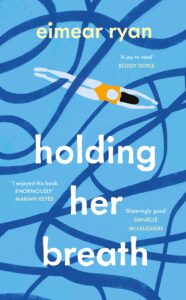
Eimear Ryan, Holding Her Breath
Custom House, May 17
In Eimear Ryan’s Holding Her Breath, Beth Crowe, a former competitive swimmer (whose Olympic dreams are shattered by a breakdown), falls in with a literary crowd who are enamored with her grandfather, the late, beloved poet Benjamin Crowe. A secret relationship, a family’s tragic past, and a woman learning to be herself are all the makings of a great story, and I’m looking forward to reading this Irish writer’s debut. –EF
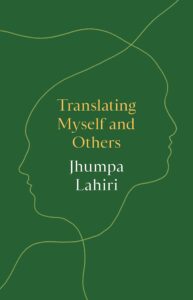
Jhumpa Lahiri, Translating Myself and Others
Princeton University Press, May 17
In recent years, Jhumpa Lahiri has been a champion of Italian writing and of literary translation itself as she chronicled her process of falling in love with the Italian language—which, she has said, made her “a tougher, freer writer.” The journey has taken her to Rome (where she has lived and worked for about a decade) to working on translations of contemporary and classic Italian literature, and, eventually, to writing a novel, Dove mi trovo, in Italian and translating it herself into English. In this book, Lahiri shares her thoughts on translation and language along with her translation of Ovid’s Metamorphoses. –CS
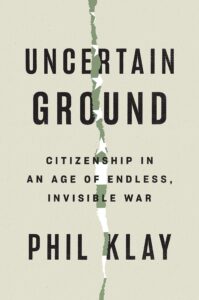
Phil Klay, Uncertain Ground: Citizenship in an Age of Endless, Invisible War
Penguin Press, May 17
In a series of essays written over the last ten years, Phil Klay, the author of the National Book Award-winning Redeployment, and Missionaries, examines the relationship (or lack thereof) of the American military to the average American citizen, reckoning with the invisibility and the importance of our ongoing wars. –ET
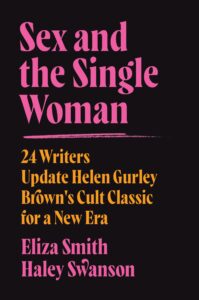
Eliza Smith and Haley Swanson, eds., Sex and the Single Woman: 24 Writers Update Helen Gurley Brown’s Cult Classic for a New Era
Harper Perennial, May 17
Revisiting and revising Helen Gurley Brown’s Sex and the Single Woman for its 60th anniversary, Lit Hub’s own Eliza Smith and Haley Swanson pay homage to Brown, while reckoning with the gaps in her work. From contraception and abortion (which the publisher had banned) to sexual consent, queer and trans identities, dating with disabilities, and more, the anthology covers the varied ground and (denied) joys of singledom. –SK
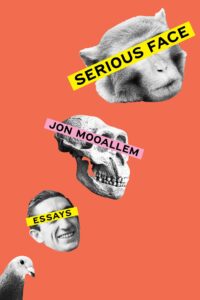
Jon Mooallem, Serious Face: Essays
Random House, May 17
Longtime New York Times writer Jon Mooallem’s new essay collection promises to be whimsical, perceptive, and generous, spanning a wide variety of topics from a global society dedicated to cloud appreciation to the philosophical pursuits of a triple-amputee doctor in San Francisco to a multi-million-dollar bird-breeding scam run by a farmer called The Pigeon King. Pigeon King alone has me sold on the book. –WC
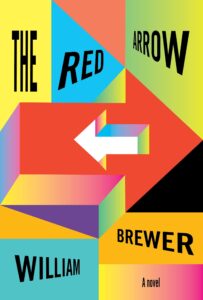
William Brewer, The Red Arrow
Knopf, May 17
In poet William Brewer’s debut novel, a once-promising young writer, suffering from depression, saddled with debt, is asked to ghostwrite a soon-to-be Nobel Prize-winning physicist’s memoir. But when the physicist vanishes, everything is threatened. Then, when the writer is asked to take a large quantity of magic mushrooms in an effort to cure his depression, the novel takes readers on a journey through art, memory, space, and time. The Red Arrow is an exploration of the human psyche. –EF
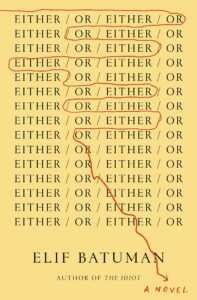
Elif Batuman, Either/Or
Penguin Press, May 24
Literary novels so rarely get sequels, in the strictest sense, but this year they’re out in force. Batuman’s latest picks up where her deeply enjoyable 2017 novel The Idiot left off, with Selin now a sophomore at Harvard, trying to untangle all that has happened, and all that could. Besides, Kierkegaard/Elliott Smith vibes will always bring me to the table. –ET
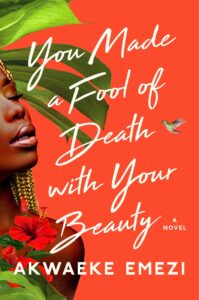
Akwaeke Emezi, You Made a Fool of Death With Your Beauty
Atria, May 24
Akwaeke Emezi is one of the most prolific writers working today. The author of Freshwater, Pet, The Death of Vivek Oji, and (most recently) Dear Senthuran is back—this time with a love story. You Made a Fool of Death With Your Beauty centers on Feyi, an artist who has been grieving the death of her great love for the past five years. An attempt to move on has brought her a wild summer in which her dreams seem to be coming true. Her art career is moving forward, and she’s dating “the perfect guy.” But there’s always a catch, isn’t there? In this case, the catch is the way she feels when a certain someone else walks into the room… You Made a Fool of Death With Your Beauty is a portrait of a woman caught between her past and her future. It asks the hard questions about what we’re willing to do to get to the next chapter of our lives. I will be eagerly awaiting pub day and, until then, listening to that glorious Florence + the Machine song, on repeat. –KY
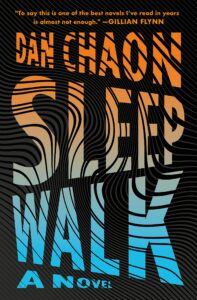
Dan Chaon, Sleepwalk
Henry Holt, May 24
Dan Chaon’s latest is a road trip novel about a “good-natured henchman” sounds like an absolute romp, which I figure we’re all going to need a little more of in 2022. Plus, it already has accolades from both Gillian Flynn and Kelly Link (who describes it as “slapstick of the sinister”) which is intriguing enough for me to pick it up. –ET
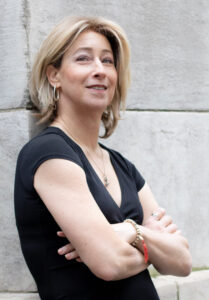
Diana Goetsch, This Body I Wore: A Memoir
FSG, May 24
In 2018, Diana Goestch published a truly incredible essay about teaching William Zinsser to write poetry in The New Yorker. Now we have her memoir, This Body I Wore, in which Goetsch gives a full account of her trans life: from childhood, to becoming a beloved high school teacher, chronicling the crossdressing subculture of ‘80s and ‘90s New York, to her late transition and becoming part of the trans community. An important and beautiful memoir. –EF
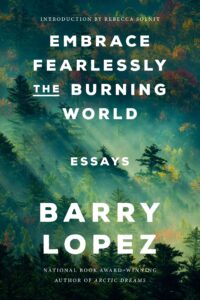
Barry Lopez, Embrace Fearlessly the Burning World: Essays
Random House, May 24
In a career spanning decades of chronicling the natural world, Barry Lopez connected his readers with the planet that sustains them, drawing wisdom from the indigenous communities with whom he spent extensive time as well as wildlife, plants, and the landscape. His many years as a nonfiction writer—of books like Arctic Dreams, which won a National Book Award, Horizon, and Of Wolves and Men—took him to terrain from the Arctic tundra to the deserts of East Africa, where he, with insight and compassion, documented the nuances of a changing planet and our relationship to it. Embrace Fearlessly the Burning World pulls together new writing from just before his death in December 2020 along with previously published work. –CS
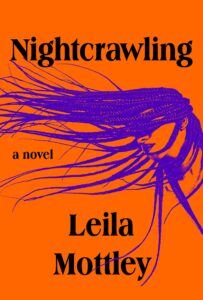
Leila Mottley, Nightcrawling
Knopf, May 24
This debut novel from the 2018 Oakland Youth Poet Laureate—written when she was just 17—tells the story of a young woman forced to become a “nightcrawler” in order to provide for her brother and an abandoned child she cares for. Based on a true story of injustice and the broken American social system, it comes complete with blurbs from Ruth Ozeki, James McBride, Tommy Orange, and Ayana Mathis, who calls it “fierce and devastating, rendered with electrifying urgency by this colossal young talent.” –ET
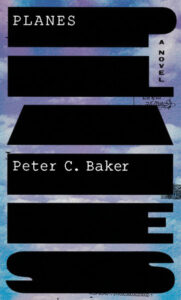
Peter C. Baker, Planes
Knopf, May 31
A story of two women: Amira is a recent convert to Islam living in Rome whose husband is imprisoned at a Moroccan black site; Mel, in North Carolina, is a former activist who tries to get the conservatives of her small North Carolina town to support her school board initiatives while she tries not think about the affair she’s having. As these two stories unfold thousands of miles apart, they resonate with each other, like two sides of the same coin. Baker’s novel is an assured debut and the announcement of a new, bold voice. –EF
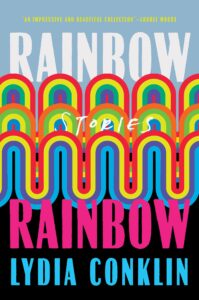
Lydia Conklin, Rainbow Rainbow
Catapult, May 31
I’ve only read the title story of this debut collection, which centers on the lives of queer, trans, and gender-nonconforming characters, but just that is good and funny enough—especially the dialogue—to have me anticipating the full package come May. –ET
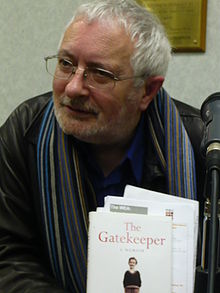
Terry Eagleton, Critical Revolutionaries: Five Critics Who Changed the Way We Read
Yale University Press, May 31
This year online, I saw readers litigate the role of the critic: should book reviews be nice, or mean? Who are book reviews for? What is the responsibility of a reviewer? In Critical Revolutionaries, Terry Eagleton examines the post-WWI lives and work of five critics: T.S. Eliot, I.A. Richards, William Empson, F.R. Leavis, and Raymond Williams. Their work merged the worlds of academia and popular culture, and shaped our conversations around the social and ethical function of literary criticism. If you care about “the state of [criticism or writing or what-have-you] today,” Eagleton provides useful context. Plus, if you’re like me, writers on writers is basically gossip, which is the best kind of text. –WC

David Sedaris, Happy-Go-Lucky
Little, Brown, May 31
Three words: new David Sedaris. His many previous books, including the most recent, Calypso, brought us comedic stories from Sedaris’ world involving the eclectic cast of characters in his family, his travels between New York and France, and, in recent decades, his life as a famous humorist. This collection—named for a recent New Yorker piece in which Sedaris explored the funnier points of conversation from his father’s final days—promises a similar offering from him. –CS
JUNE
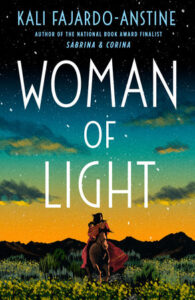
Kali Fajardo-Anstine, Woman of Light
One World, June 7
From the author of the celebrated story collection Sabrina & Corina comes a new tale of an Indigenous Chicano family, told across generations. At its heart is Luz, a tea leaf reader, whose brother is attacked by a violent white mob. Our heroine is alone in the world—until she starts having visions of her ancestors. Woman of Light is an entrancing book about the stories we carry, the ones we need to keep telling. What family secrets lay in her bloodline? What great love? National Book Award finalist Kali Fajardo-Anstine has given us another stunning cast of characters to root for. –KY
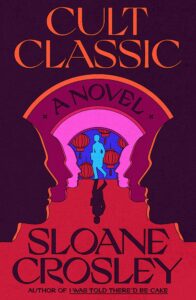
Sloane Crosley, Cult Classic
MCD, June 7
I’ve long been a fan of Crosley’s wry, irreverent personal essays and cultural commentary, so I’m very much looking forward to reading her latest novel, which is billed as a “surrealist meditation on love in an age when the past is ever at your fingertips and sanity is for sale.” Yep, very good, sign me up. –ET
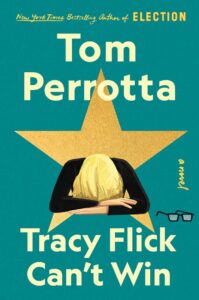
Tom Perrotta, Tracy Flick Can’t Win
Scribner, June 7
After a 23-year hiatus, Tom Perrotta’s most iconic character (with apologies to Kevin Garvey) is back. Tracy Flick—the high-strung, uber-ambitious, obnoxiously self-confident high school student who urged her classmates to “Pick Flick” for student body president—is now a middle-aged and under-appreciated New Jersey assistant principal with her eye on the top job, worried that the school district Superintendent is plotting against her. Expect another whip-smart, darkly comic skewering of American suburbia from one of the masters of the genre. Here’s hoping Reese Witherspoon is already in talks for the adaptation. –DS
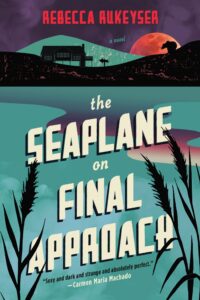
Rebecca Rukeyeser, The Seaplane on Final Approach
Doubleday, June 7
At a remote wilderness lodge in the Kodiak Archipelago, Mira is a seasonal worker in pursuit of sleaze. It sounds like a horny bottle episode of a novel that’s also a workplace comedy at the edge of the world. According to Tony Tulathimutte, “It’s like if Muriel Spark got seasick and dropped molly instead of dramamine.” I’m extremely into it. –JG

Keith Gessen, Raising Raffi
Viking, June 7
An honest account of the first five years of fatherhood from novelist and translator Keith Gessen, a founding editor of n+1 and the husband of novelist Emily Gould. For a taste, read his 2019 essay about discipline, love, and rage, here. –ET

Joseph Osmundson, Virology: Essays for the Living, the Dead, and the Small Things in Between
W.W. Norton, June 7
The last two years have made amateur virologists of us all. And though the idea of virality as the central metaphor for contemporary digital life has lost some of its sheen (in the face of so much IRL virality) it nonetheless retains much of its power. Luckily, we have Joseph Osmundson—an actual virologist—who writes with elegance and insight about the intersection of the real and the metaphorical, moving through topics like the legacy of HIV/AIDS, the long-term impact of Covid variants, and the effects of a prolonged pandemic on our systems of power. This is very much a book of our times. –JD
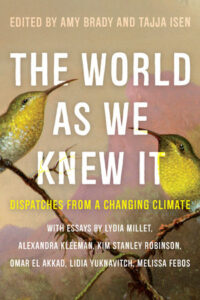
Amy Brady and Tajja Isen, eds., The World As We Knew It
Catapult, June 14
Amy Brady, executive director of Orion, and Tajja Issen, editor-in-chief of Catapult, have both long supported writers that tell the story of the climate crisis in unconventional, engaging ways. Now, the two have joined forces to edit The World As We Knew It, an anthology that draws in voices from across the fields of literature and environmental writing to show what a global catastrophe looks like on an individual level. With contributions from Alexandra Kleeman, Kim Stanley Robinson, Omar El Akkad, Melissa Febos, and many others, this book offers input from some of our most inventive and exciting contemporary essayists on our rapidly changing world. –CS
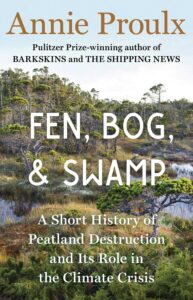
Annie Proulx, Fen, Bog, & Swamp
Scribner, June 14
Anybody who knows me knows I love bogs, so you better believe I’d be reading this one even if it wasn’t written by the Pulitzer Prize-winner author of The Shipping News, Barkskins, and “Brokeback Mountain.” Lifelong environmentalist Proulx’s history of our wetlands (from the fens of 16th-century England to the modern-day plight of the Amazon rainforest), their ecological role, and what their systematic destruction means for the planet looks to be both a fascinating natural history and a vital call-to-arms by one of the country’s greatest living writers. –DS
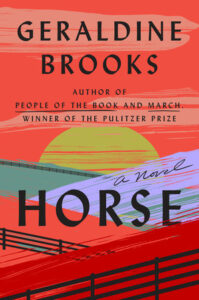
Geraldine Brooks, Horse: A Novel
Viking, June 14
Geraldine Brooks—author of March, which won a Pulitzer Prize, along with Caleb’s Crossing, People of the Book, and Year of Wonders—is back with a novel with its roots in the story of Lexington, a leading racehorse in the mid-19th century. The story reaches from 1850s Kentucky to a century later in New York City and, eventually, present-day Washington, DC, showing the echoes of history across a multitude of lives. –CS
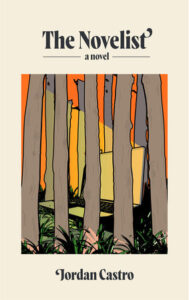
Jordan Castro, The Novelist
Soft Skull, June 14
Jordan Castro is the previous editor of New York Tyrant Magazine, which published barbed, efficient, emotional writing that lacked the didacticism and slow pacing of other outlets. I expect similar from Castro’s debut novel, which the titular novelist over a single morning as he struggles to write an autobiographical novel based on his own heroin addiction and recovery. I care about novelists, so I’m excited. –WC
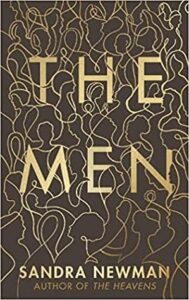
Sandra Newman, The Men
Grove Press, June 14
In 2019, I tried to get everyone I knew to read Newman’s The Heavens, a subtle and provoking time travel novel that pulled off a remarkable trick I won’t elaborate on here. Her latest book also promises to delight me, considering that the premise is that all men on earth have spontaneously disappeared—or at least been relocated. I’d follow Newman anywhere, and I’ll definitely follow her here—can’t wait. –ET
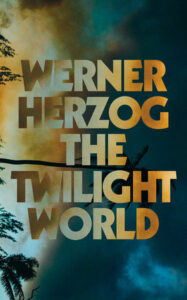
Werner Herzog, The Twilight World
Penguin, June 14
Yes, you read that right; the most intriguing and sibylline filmmaker of the last fifty years is publishing a novel, and it sounds extremely on brand. The Twilight World tells the story of Hiroo Onoda, a real-life Japanese solider who “defended” a small island in the Philippines for twenty-nine years after the end of World War II. Herzog, of course, met and befriended Onoda in Tokyo back in the 90s, teasing out the tale of soldier’s long war, a tale which the German auteur has now immortalized in a modern-day Robinson Crusoe story, described by its publisher as a “glowing, dancing meditation on the purpose and meaning we give our lives.” –DS
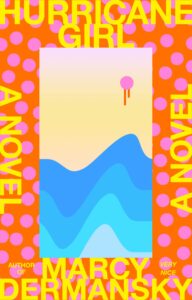
Marcy Dermansky, Hurricane Girl
Knopf, June 14
Marcy Dermansky’s last book, Very Nice, was “wickedly fun and emotionally potent,” and with its gonzo stakes Hurricane Girl promises a similar tonal mixture. Allison has just run away from her movie producer boyfriend and built a modest life for herself, but then a hurricane ruins it all, and her set of guiding questions radically transforms: “Should she go home from the bar with the strange cameraman and stay in his guest room?” reads Knopf’s description. “Is that a glass vase he smashed on her skull? Can she wipe the blood from her eyes, get in her car, and drive to her mother’s? Does she really love the brain surgeon who saved her, or is she just using him for his swimming pool?” I’m already invested. –WC
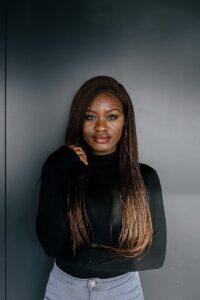
Bolu Babalola, Honey and Spice: A Novel
William Morrow, June 21
Bolu Babalola’s debut novel centers on college student Kiki Banjo, a relationship expert who hosts Brown Sugar, Whitewell University’s student radio show. Kiki meets her match in resident playboy Malakai Korede, who she dubs “The Wastemen of Whitewell.” Like any good rom-com, the book features fake relationships, missed communication, and enough romantic tension to cut with a steak knife. In January of this year, Babalola tweeted her excitement about the forthcoming novel: “This has been technically four years coming, but really it’s been my whole life. Four years, three versions, a masters degree and another book in between.” –VW
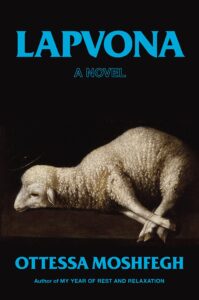
Ottessa Moshfegh, Lapvona
Penguin, June 21
I loved My Year of Rest and Relaxation. I even loved that bit at the end that seemed to piss a lot of people off (I thought it was cool and I will not recant or apologize). Anyway, Moshfegh’s new novel sounds like a pretty significant departure for the author. Set in a medieval fiefdom beset by natural disasters, Lapvona is the story of a motherless shepherd boy, his bond with a mysterious and mystical village midwife, and his run-in with the family of an evil local lord. I’m imagining Buried Giant with more bodily fluids. –DS
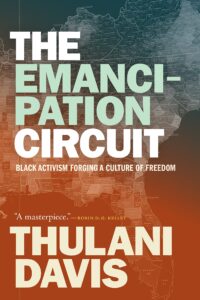
Thulani Davis, The Emancipation Circuit: Black Activism Forging a Culture of Freedom
Duke University Press, June 24
In a distinguished career spanning decades, Thulani Davis has expanded our understanding of freedom and justice with novels, poetry, plays, screenwriting, and scholarship. The Emancipation Circuit is her study of the ways that millions of formerly enslaved people changed America during Reconstruction as they formed new communities, political alliances, educational strategies, and networks of aid—a sweeping, fascinating history, about which I’m looking forward to learning more. –CS

Jess Walter, The Angel of Rome: And Other Stories
Harper, June 28
Jess Walter’s new collection of stories gives us characters as diverse as an actor in recovery, an exchange student in Rome, a teenage girl grappling with the loss of her mother, and a young gay man struggling to connect with his elderly father. Walter is sure to bring his poignant touch to these stories as he did with his previous books, Beautiful Ruins and The Cold Millions. –CS
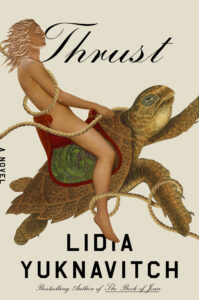
Lidia Yuknavitch, Thrust
Riverhead, June 28
I’ll read anything by Lidia Yuknavitch (and anything sandwiched in that glorious cover). Thrust tells the story of a motherless girl growing up amid the chaos of climate change and a growing police state who, after learning that she has the power to travel through time, harnesses that skill to rescue folks in the past. You know what they say about great power and responsibility… –ES
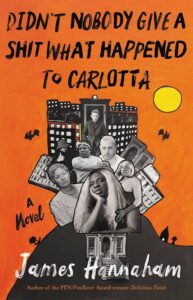
James Hannaham, Didn’t Nobody Give a Shit What Happened to Carlotta
Little, Brown, June 28
From the author of PEN/Faulkner Award winner Delicious Foods, a novel about a trans woman’s re-emergence into the world after spending 20 years in a men’s prison—the action centered on one Fourth of July weekend. Also obviously an early contender for the best title of the year. –ET
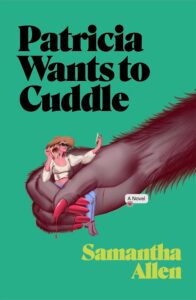
Samantha Allen, Patricia Wants to Cuddle
Zando, June 28
Samantha Allen (Real Queer America) wrote for Lit Hub recently about the direct line between slasher films and elimination-style reality TV, and she brings those genres together in her debut novel, Patricia Wants to Cuddle. On a creepy island in the Pacific Northwest, four “Final Girls” competing for love on The Catch discover the stakes are infinitely higher than expected. –ES
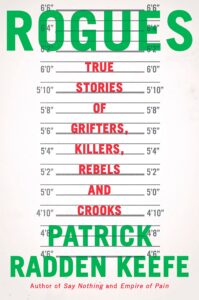
Patrick Radden Keefe, Rogues: True Stories of Grifters, Killers, Rebels and Crooks
Doubleday, June 28
This volume collects a dozen New Yorker articles by staff writer Keefe, who is also the celebrated author of Say Nothing and the recent Empire of Pain, which, he writes in the preface, cover “some of my abiding preoccupations: crime and corruption, secrets and lies, the permeable membrane separating licit and illicit worlds, the bonds of family, the power of denial.” –ET
JULY AND BEYOND
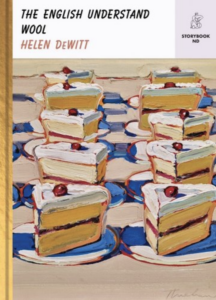
Helen DeWitt, The English Understand Wool
New Directions, July 5
Helen DeWitt’s The Last Samurai was a stroke of genius. I have thought about that novel a lot this year, and I don’t think I will ever understand how she managed such a masterful control over the narrative. After that, I will read anything Helen DeWitt puts her name on, so I’m particularly stoked for the release of her latest, The English Understand Wool. (What a great name!) This novella will follow a 17-year-old whose parents have very specific rules, mostly concerned with “good taste.” But that might all go right out the window during annual Ramadan travels, when finds herself alone in New York. Still not quite sure what this is going to be about? Same. A visit to the New Directions website tells me nothing else, but I did stumble upon Helen DeWitt’s official bio, the last line of which reads: “She has been based in Berlin since 2004, but also spends time at a cottage in the woods of Vermont improving her chainsaw skills.” Her chainsaw skills! I realize she means that literally, but it also applies to her work on the page. Helen DeWitt has this magical ability to cleanly cut open a story and the hearts of her readers along with it. –KY
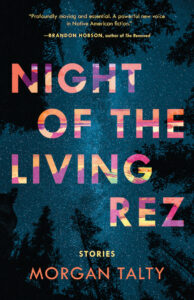
Morgan Talty, Night of the Living Rez
Tin House, July 5
A collection of stories set in a Native community in Maine, Talty’s book centers questions of what it means to be Penobscot today—what it means to live through and reckon with historical tragedies. Talty grapples with such complicated inheritances with tenderness and humor, with characters ranging from a boy who finds an old curse in a jar to a grandmother struggling with Alzheimer’s. –SK
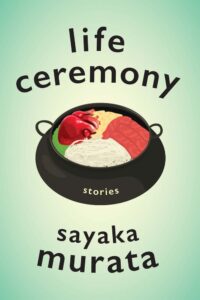
Sayaka Murata, tr. Ginny Tapely Takemori, Life Ceremony: Stories
Grove Atlantic, July 5
This first translated collection of stories from Lit Hub favorite Sayaka Muraka, author of Convenience Store Woman and Earthlings, is almost guaranteed to be weird as hell, which, it may not surprise anyone reading this to hear, is exactly what I want in a book of any kind. –ET

Chinelo Okparanta, Harry Sylvester Bird
Mariner Books, July 12
Chinelo Okparanta’s second novel is told from the perspective of a white man who desperately wants to escape his racist, xenophobic, secret-keeping family. When he finally moves to New York City, Harry falls in love with a Nigerian woman. It’s a premise that could tip in a number of different directions, but Okparanta’s novel is “a satire that speaks to all the most pressing tensions and anxieties of our time.” –JG
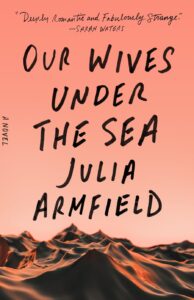
Julia Armfield, Our Wives Under the Sea
Flatiron, July 12
At the beginning of Armfield’s debut novel, Leah and Miri are reunited after Leah returns from a routine—but ultimately disastrous—deep sea mission. But soon Miri begins to realize that her wife is not the same woman she was before she left, and that in fact, something is very, very wrong. –ET
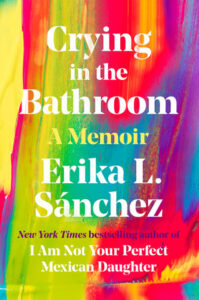
Erika Sánchez, Crying in the Bathroom
Viking, July 12
Erika Sánchez’s memoir-in-essays charts her life from her troublemaking childhood in 1990s Chicago to her present-day as a poet and novelist. Topics include white feminism, sex, depression; Crying in the Bathroom is a witty and confessional tour of Sánchez’s mind. –WC
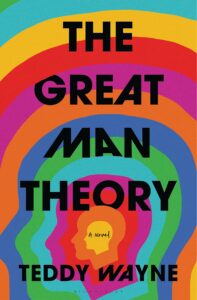
Teddy Wayne, The Great Man Theory
Bloomsbury, July 12
Teddy Wayne is the darkly comic author of Apartment, back again with a story of masculinity in America. Paul, the titular (and wannabe) “Great Man,” spends his days lecturing his young daughter about the “authoritarian creeps” running the country, lecturing his students about his views on said creeps, lecturing his friends on said creeps, and so on. Believing himself to be the only person who can truly understand the current political climate, and seemingly abandoned by most people in his life who don’t want to spend their time being lectured on things they already know, Paul formulates a plan to save the country, and maybe show everyone just how right he was. A picture of the world as we know it, from the point of view of a funny, aggravating man, The Great Man Theory is an original and discomfiting portrait of the individual in the collective, as he tries to make his mark. –JH
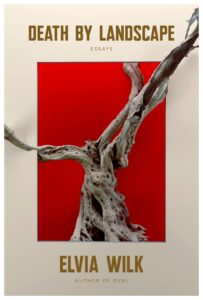
Elvia Wilk, Death by Landscape: Essays
Soft Skull, July 19
Erotics of compost, vampires, medieval nuns, and solarpunk. Wilk’s “fan nonfiction,” examines the works of Anne Carson, Octavia Butler, Michelle Tea, and more to probe the lines and shapes of “weird fiction” in the face of extinction and all its urgency and anxieties. At the heart of it are questions of how to tell stories that center the Earth as opposed to humans, that help us grapple with the end of the world, and that help us see and be with the dark of it all. –SK

Dwyer Murphy, An Honest Living
Viking, July 26
I was fortunate enough to get my grubby mitts on an early copy of my colleague Dwyer Murphy’s debut novel—a gloriously-atmospheric, razor-sharp, and super stylish noir set in early 2000s New York—and it blew my fedora clean off. An Honest Living is the story of a jaded attorney-turned-private eye, drawn into the shady underground world of rare book dealers, who finds himself caught in a tangled web of obsession and deceit spun by an alluring novelist and her eccentric (missing) husband. Murphy, the editor-in-chief of CrimeReads, knows classic mystery fiction and film inside out, and his novel is both expertly crafted modern-day neo-noir, and an utterly beguiling homage to one of the genre’s most iconic stories. –DS
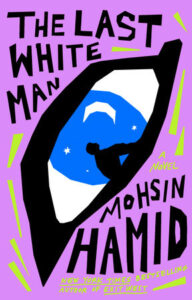
Mohsin Hamid, The Last White Man
Riverhead, August 2
Mohsin Hamid’s Exit West, published in 2017, was a gorgeously written story of two lovers struggling to maintain their lives across war and the brutality of contested borders. I couldn’t be more excited to read his upcoming book, which, like Exit West, shows two lovers grappling with the consequences of power and injustice: they face a world in which some people’s complexions have suddenly begun to darken and all the consequences that follow. –CS

Emmanuel Carrère, tr. John Lambert, Yoga: A Novel
Farrar, Straus and Giroux, August 2
What will Emmanuel Carrère do next? This is the self-described story of a “breakdown,” beginning with a Buddhist meditation retreat that is cut short, followed by a series of events including breakdown of a marriage, depression, treatment in a psychiatric facility, and eventually a process of settling in Greece. This seems like a gripping story, and I can’t wait to read it. –CS
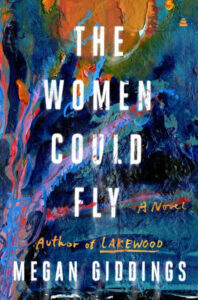
Megan Giddings, The Women Could Fly
Amistad, August 9
Lakewood author Megan Giddings offers a dystopian sophomore novel about 28-year-old Josephine Thomas, a Black woman who has never made sense of her mother’s disappearance. There’s the terrifying thought that Josephine doesn’t want to consider: was her mother a witch? Now, 14 years after her mother seemingly vanished into thin air, Josephine is fast approaching the state-mandated cut-off for marriage at age 30. Will Josephine learn the truth about her mother—and herself? I’m always down for stories about witches, especially if they’re about witches of color. In Giddings’s capable hands, I’m sure the narrative will be equal parts magic and revelatory. –VW
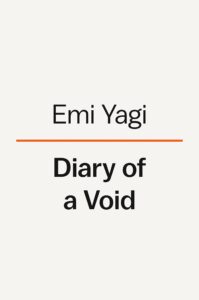
Emi Yagi, Diary of a Void
Viking, August 9
Emi Yagi’s debut novel has one of the most fun premises I’ve heard all year: when protagonist Ms. Shibata gets a new job to escape her old job’s sexual harassment, she is expected to do all the menial work as the only woman at her new job. To avoid this, she pretends to be pregnant—and her life gets better. And worse. Diary of a Void already won the Dazai Osamu Prize in Japan, and now we get to read it in a translation by Lucy North and David Boyd. –WC
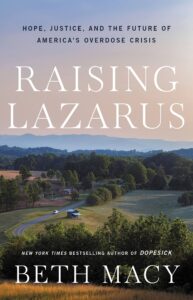
Beth Macy, Raising Lazarus: Hope, Justice, and the Future of America’s Overdose Crisis
Little, Brown, August 16
Macy’s follow-up to her bestselling Dopesick brings her essential reporting on the American opioid epidemic up to the present day, examining not only the political, financial, racial, and social elements at play, but also what happens when you throw a pandemic into the mix. –ET
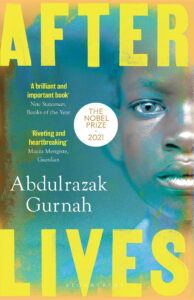
Abdulrazak Gurnah, Afterlives
Riverhead, August 23
The winner of this year’s Nobel Prize in Literature, Gurnah’s latest novel, published in the UK in September 2020, is finally hitting shelves in the US. Afterlives is a sweeping historical novel that explores the brutality of life in East Africa under colonial rule. It sounds like a fascinating, necessary novel, though to be honest, they had me at “Nobel Prize in Literature.” –JG

Andrew Sean Greer, Less Is Lost
Little, Brown, September 4
We don’t know much, but we do know that Arthur Less is back in Greer’s follow-up to his Pulitzer prize-winning Less: A Novel. Mark your calendars! –ET
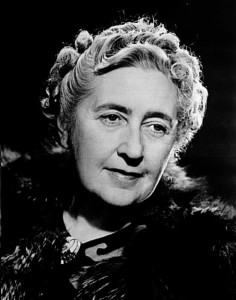 Agatha Christie, Untitled Marple Collection
Agatha Christie, Untitled Marple Collection
William Morrow, September 13
Our favorite detective is back in this collection of original short stories. Gathering twelve different writers (Naomi Alderman, Leigh Bardugo, and Alyssa Cole, to name a few), the collection reimagines Miss Marple. Through these reiterations of one of Christie’s most famous detectives, the collection balances the work of preserving Miss Marple’s idiosyncrasies, while bringing to the surface new elements, new facets. –SK
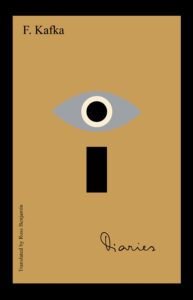
Franz Kafka, tr. Ross Benjamin, The Diaries of Franz Kafka
Schocken, September 13
In this new translation of Kafka’s diaries, Benjamin offers an unexpurgated collection of diary entries that highlight the quintessential Kafkian eccentricities underscoring the writer’s body of work. Beginning with 1909 and ending in 1923, the diary entries range from drawings to accounts of dreams to drafts of letters to daily events. Available in English for the first time, Benjamin’s translation not only emphasizes the significance of diaries in Kafka’s writing and larger life, but also highlights the importance of the diary-from as art in its own right. –SK

Namwali Serpell, The Furrows
Hogarth, September 27
Namwali Serpell’s latest book follows the fallout from a family’s tragic loss after their son disappears at the age of seven, his body never found. Serpell, who won the 2020 Windham-Campbell Prize for fiction and 2015 Caine Prize for African Writing, is one of the world’s most exciting contemporary novelists, and I’m eagerly anticipating this new work from her. –CS
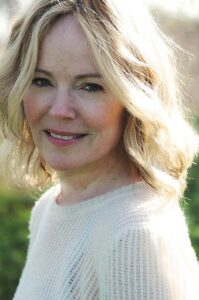
Dani Shapiro, Signal Fires
Knopf, October 2022
According to EW, the story behind Dani Shapiro’s first novel in 15 years is one that should give hope to those of us with discarded manuscripts: on a cleaning spree in the early days of quarantine, Shapiro rediscovered the scrapped novel and returned to it with gusto. What we know thus far is it takes place for a group of characters across three points in time: Y2K, December 2010, and 2020—though it’s decidedly not a pandemic novel. Even if it were, I’d still be looking forward to it. –ES
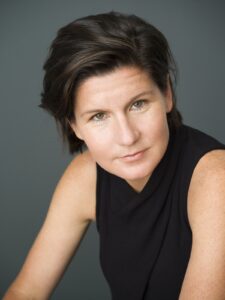
Lynn Steger Strong, Flight
Custom House, Fall 2022
I was a fan of Lynn Steger Strong’s 2020 novel, Want, and I’m looking forward to her bringing that same sharp writing and incisive commentary to Flight, this time in a multi-perspective novel. She told EW that her elevator pitch is “a matriarch dies and a little girl goes missing,” which is enough of a teaser for me! –ES



